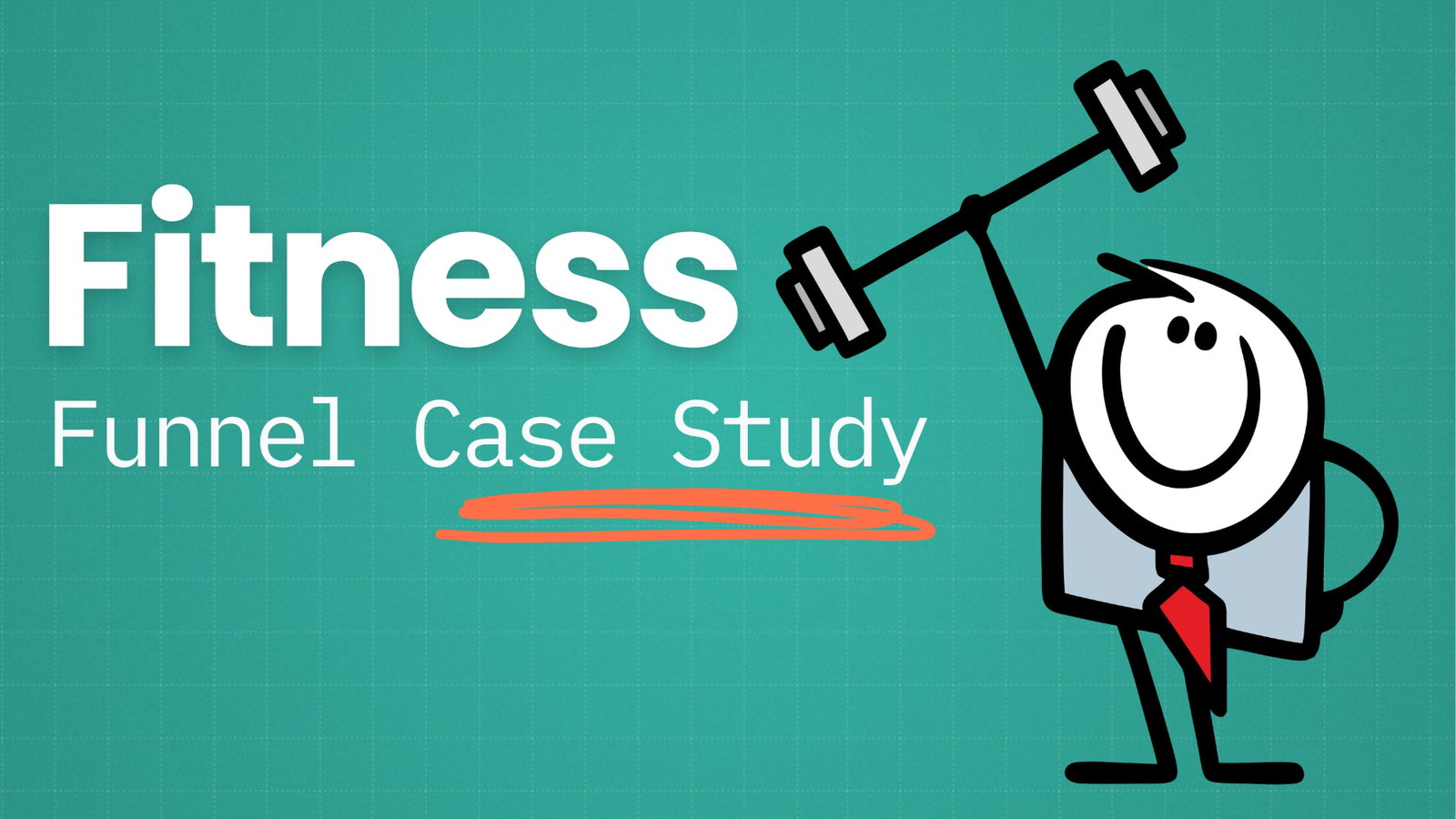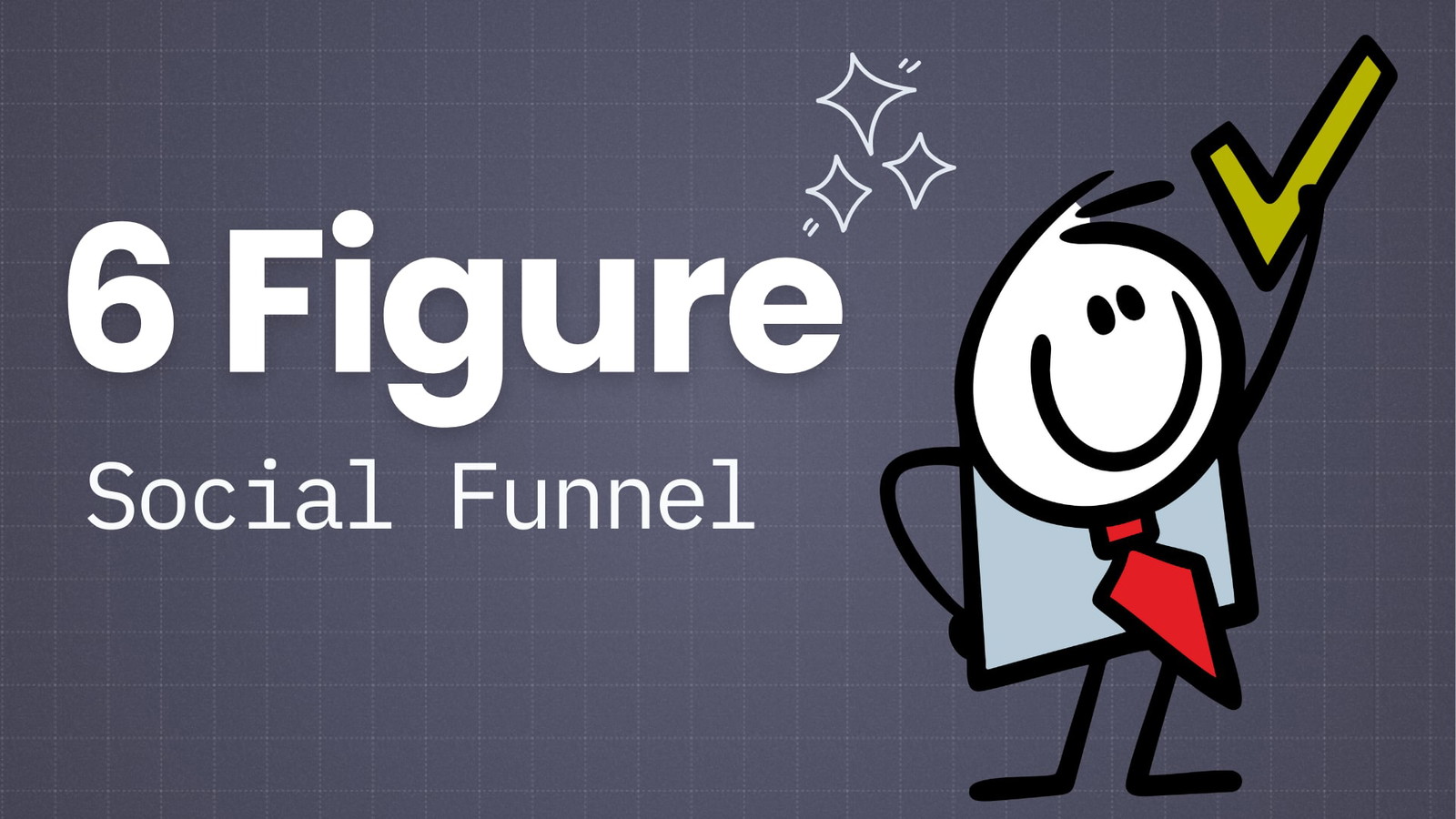We surveyed 3,812 digital marketers to find out exactly how they’re leveraging AI.
We asked them 27 thought-provoking questions to paint a detailed picture of this rapidly evolving landscape.
Key Takeaways From The Survey
Here’s a summary of the most interesting findings and key statistics:
75.7% of marketers are now using AI tools for work. This shows just how fast AI has been adopted in the industry.
AI is being used regularly too, with 49.5% of marketers using AI tools multiple times per week or more.
69% of marketers are using ChatGPT, largely due to OpenAI making it widely available for free to everyone.
AI content quality is already seen as really good. 65.8% of people think AI content is equal to or better than human writing.
63% of AI adopters cite inaccuracies in AI content as a major challenge. This is widely known but hasn’t put many people off using AI.
85.1% of marketers are using AI for article writing. This is a very large percentage and shows just how popular AI content creation has become in a short amount of time.
It is becoming incredibly important to know about AI for your job. 98.1% of marketers acknowledge that some understanding of AI is important for their job.
AI is putting some jobs more at risk than others. 81.6% of marketers think content writers’ jobs are at risk because of AI.
Companies are already replacing people. 32.9% of businesses have already replaced some human tasks with AI solutions.
60% of marketers feel positive about the rise of the AI industry. The sentiment is largely positive as marketers have lots to gain from using this technology.
Just recently, many marketers were worried about losing search traffic to AI. Now only 30.1% of Marketers think AI will negatively impact search traffic in 5 years.
There is concern about service providers not disclosing the use of AI in their work. 54.9% of respondents suspect they’ve received undisclosed AI content from a service provider.
About This Survey
We created a 27-question survey to learn more about how digital marketers are harnessing AI technology. To reach a broad audience, we promoted the survey to our 100k email subscribers, shared it on Twitter, dropped it in our Podcast, and hit up our Facebook and Discord communities. We also ran a few paid ads on Facebook and Twitter to boost responses.
In just seven days, we collected 3,812 responses – five times more than any other survey we have run. No surprise there, given the surge in interest in AI right now.
Just over 50% of respondents were website owners, while freelancers made up one-fifth. The rest were a near even mix of agencies, in-house employees, and other marketers.
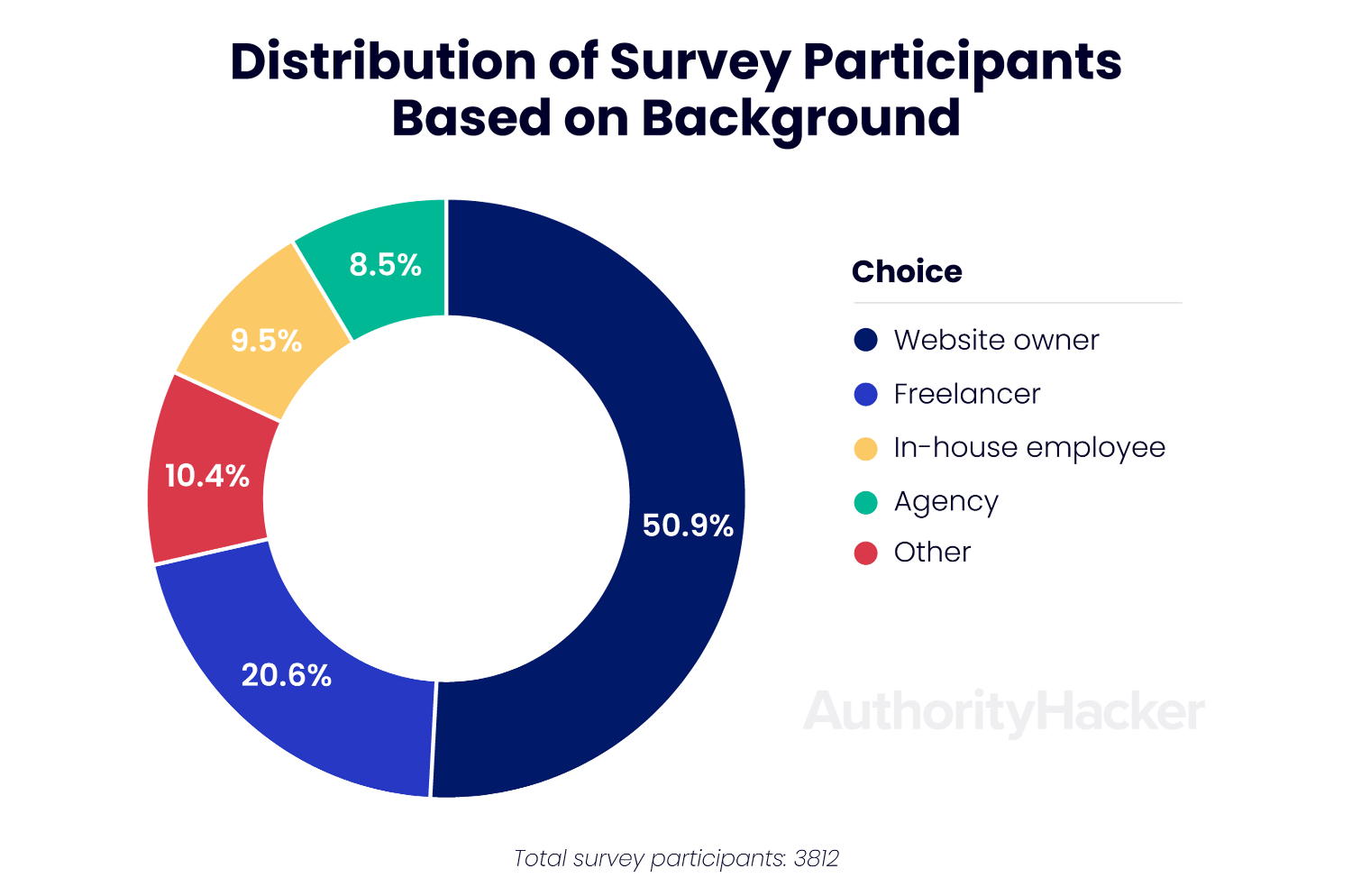
At Authority Hacker, our content caters to website owners. So it makes sense that half of the survey participants fall into this group.
We also tracked the geographic distribution of participants and found an impressive representation from 134 countries. We categorized these by region. North America, Europe, and Asia made up the majority of the participants.
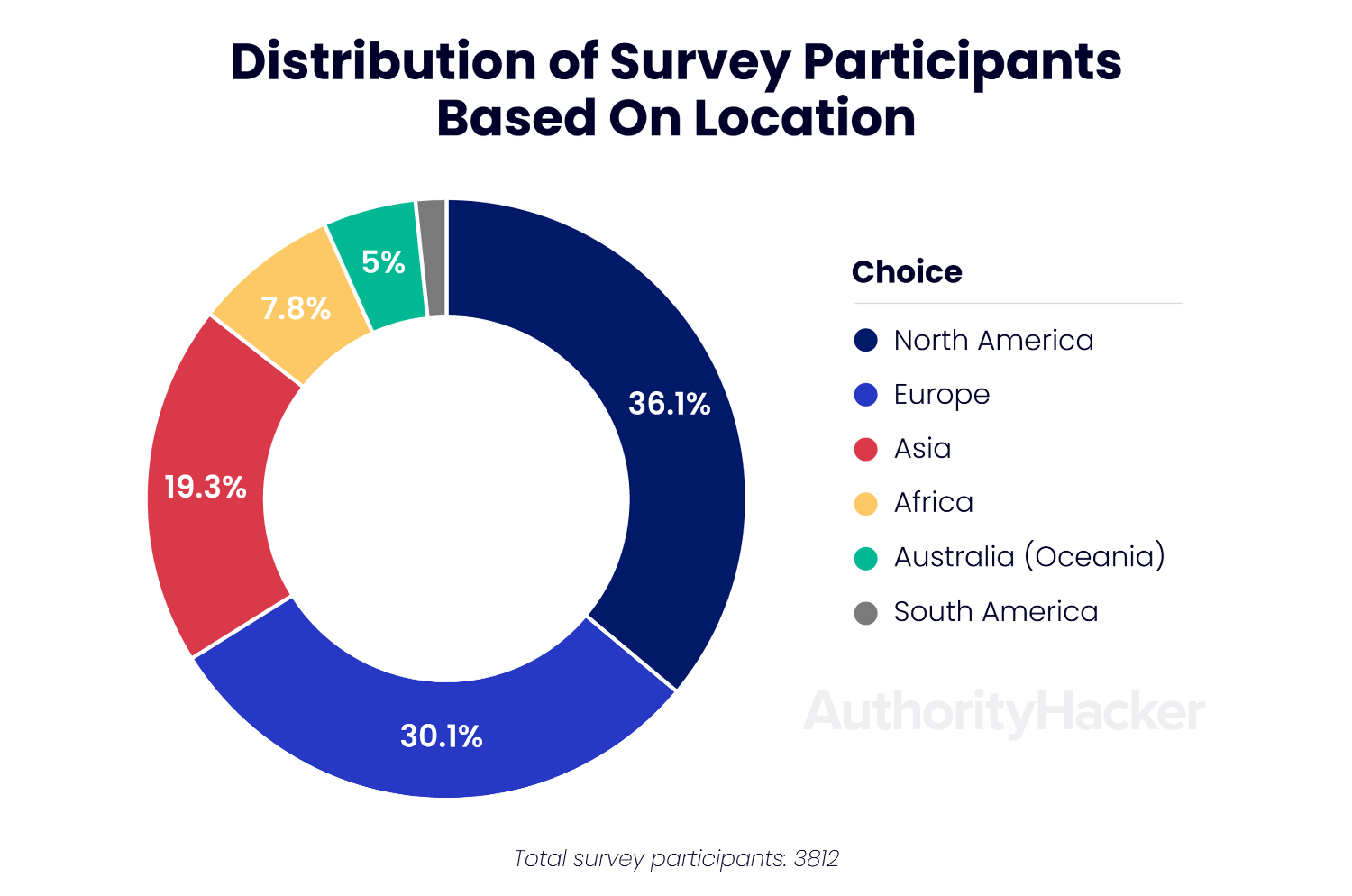
75.7% of Marketers Are Now Using AI Tools for Work
We’ve all seen the headlines that ChatGPT is the fastest growing app of all time. But the survey reveals that a staggering 75.7% of online marketers already use AI tools in their daily work.
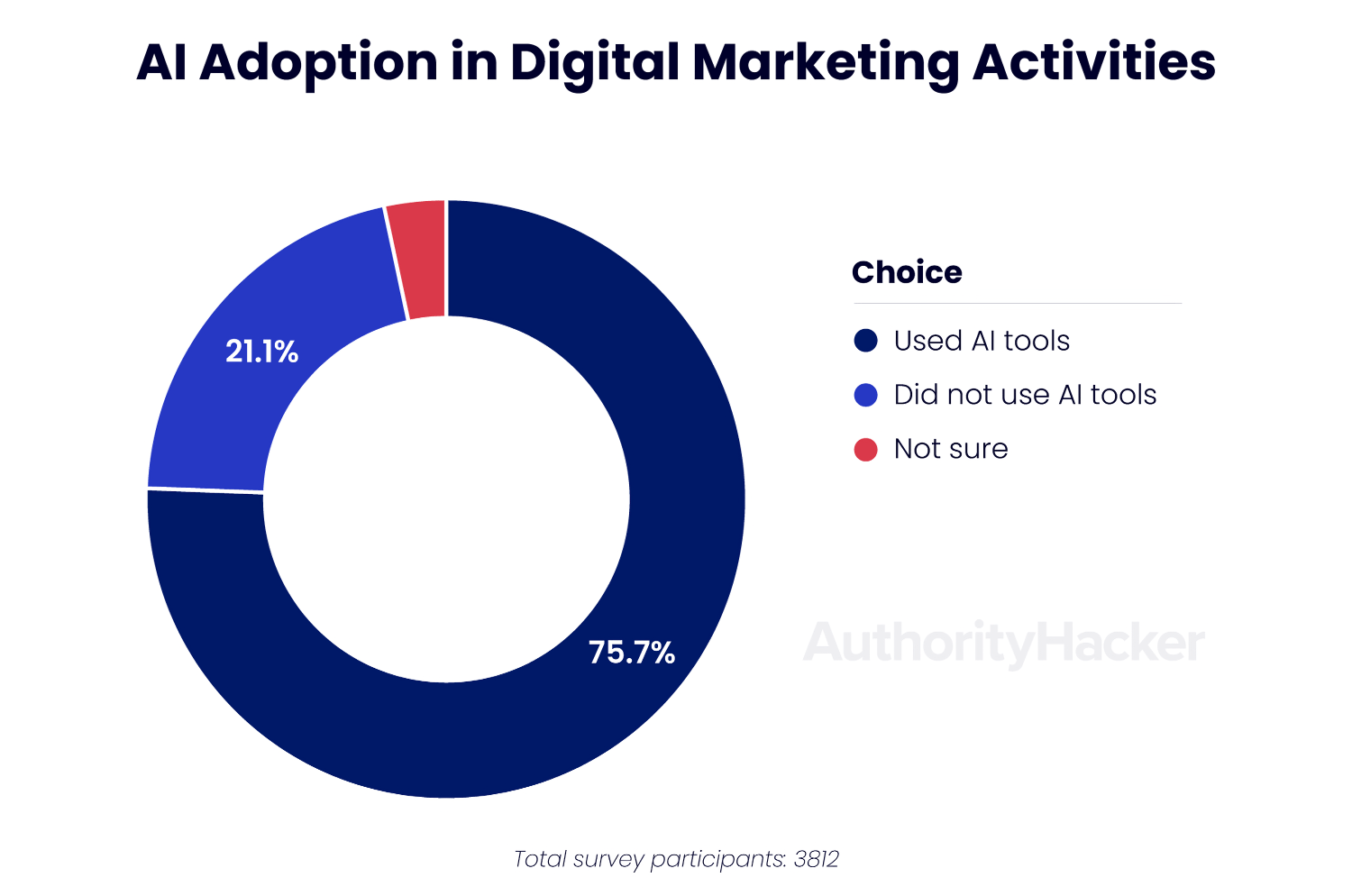
Let that sink in for a moment. AI isn’t some future tech – it’s here, now, and actively being used by a vast majority of people in the online marketing landscape
We can only see this number increasing as more people unlock its potential at work.
49.5% Of Marketers Are Using AI Tools Frequently
We split out the respondents who said they are using AI and found that 30.3% use it daily. A further 33.8% use it several times per week.
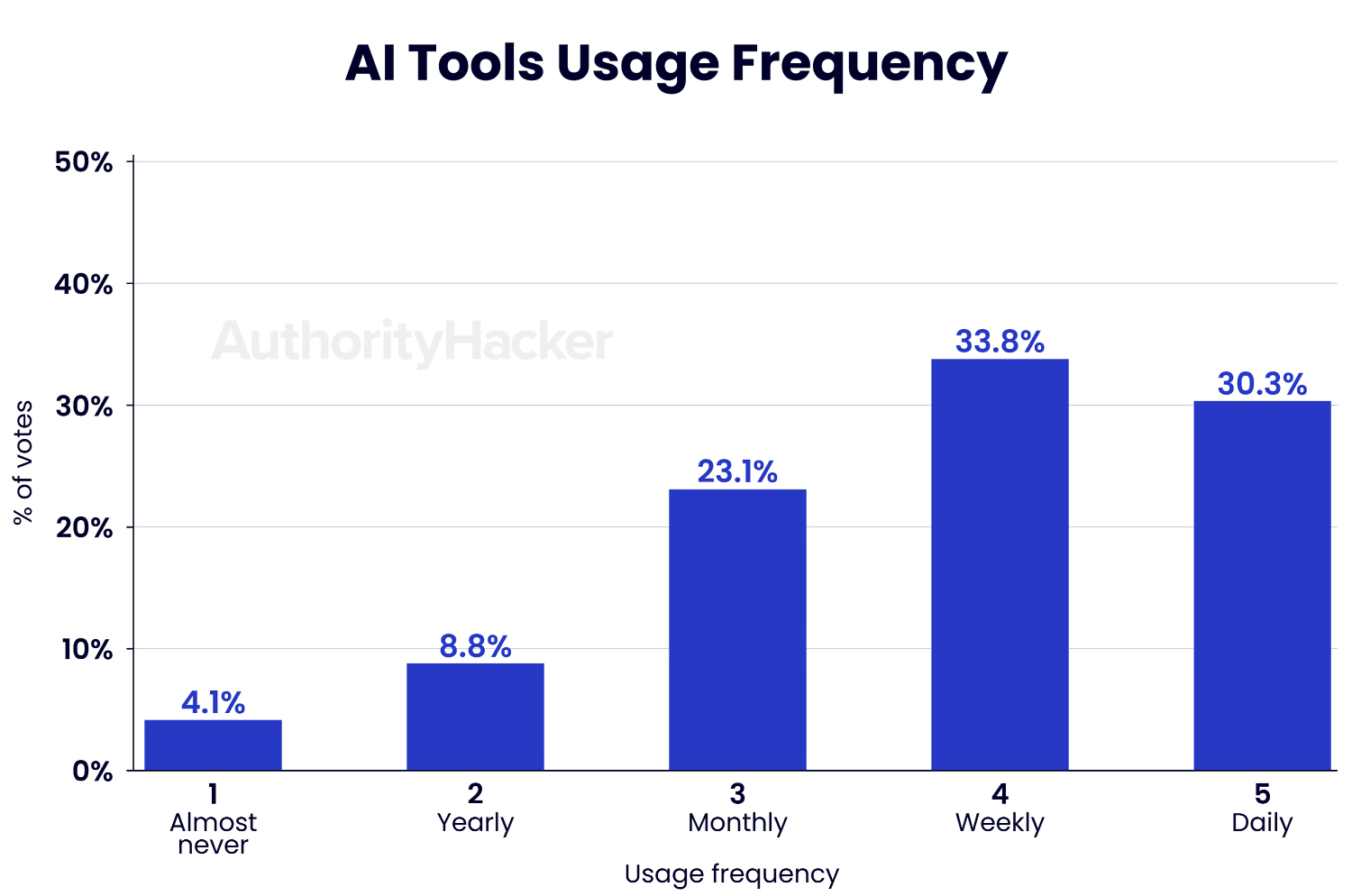
When compared to all survey respondents, the combined total (64.1%) equates to 49.5% of all marketers.
It appears we’ve moved beyond early adopters just testing it out into an era where AI is becoming a core component of work for many professionals. It’s hard to imagine this trend slowing down any time soon either.
Lack Of Knowledge And Lack Of Time Are The Two Biggest Reasons Against Using AI Tools
We wanted to understand why 21.1% of survey respondents haven’t yet embraced AI. Their main reasons?
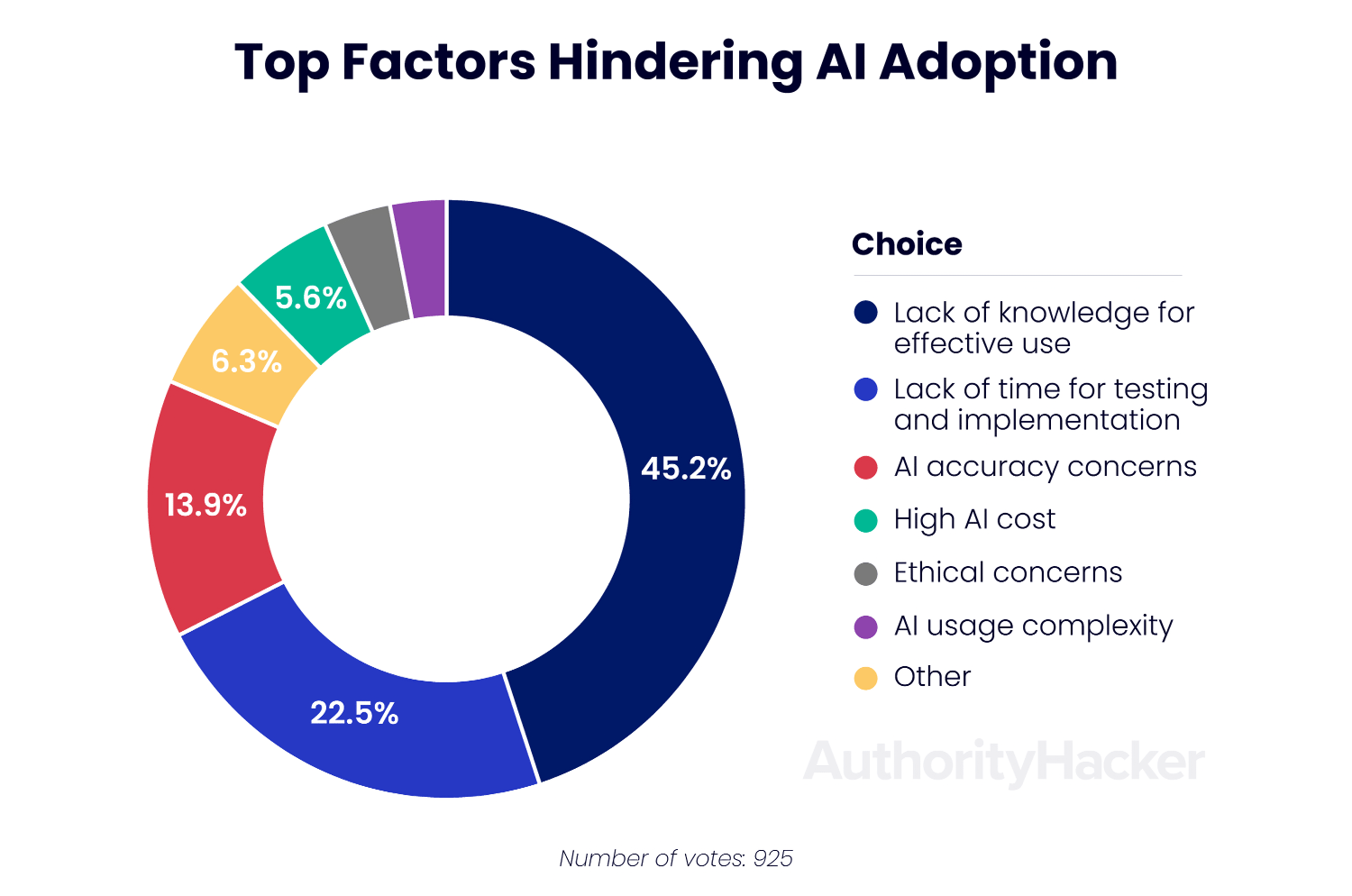
The majority 45.2% cited a lack of knowledge as the barrier. The learning curve for using tools like ChatGPT is really small. Most users grasp it after just a few prompt-writing attempts.
Its natural language interaction also makes it very user friendly. I suspect that many people perceive the learning process will be more challenging than it actually is.
Lack of time held back others, which is ironic considering AI’s time-saving capabilities. It’s possible that people believe it will take too long to learn how to use it effectively. Anecdotally, I’ve seen technophobes like my mom pick it up in 15 minutes or so.
Lastly, 13.9% worried about the accuracy of AI data or content. This is a valid concern as AI frequently makes stuff up. And it sounds very confident when it does. To combat this, ask the AI to give you a confidence score for something it’s said. This will reveal its true position in a more objective manner.
69% Of Marketers Are Using ChatGPT, Making It By Far The Most Popular AI Tool
ChatGPT is 4 months old at the time of writing. Yet 89.3% of all AI adopters are using it already. That works out to 69% of all marketers. This beats all other AI tools by a significant margin.
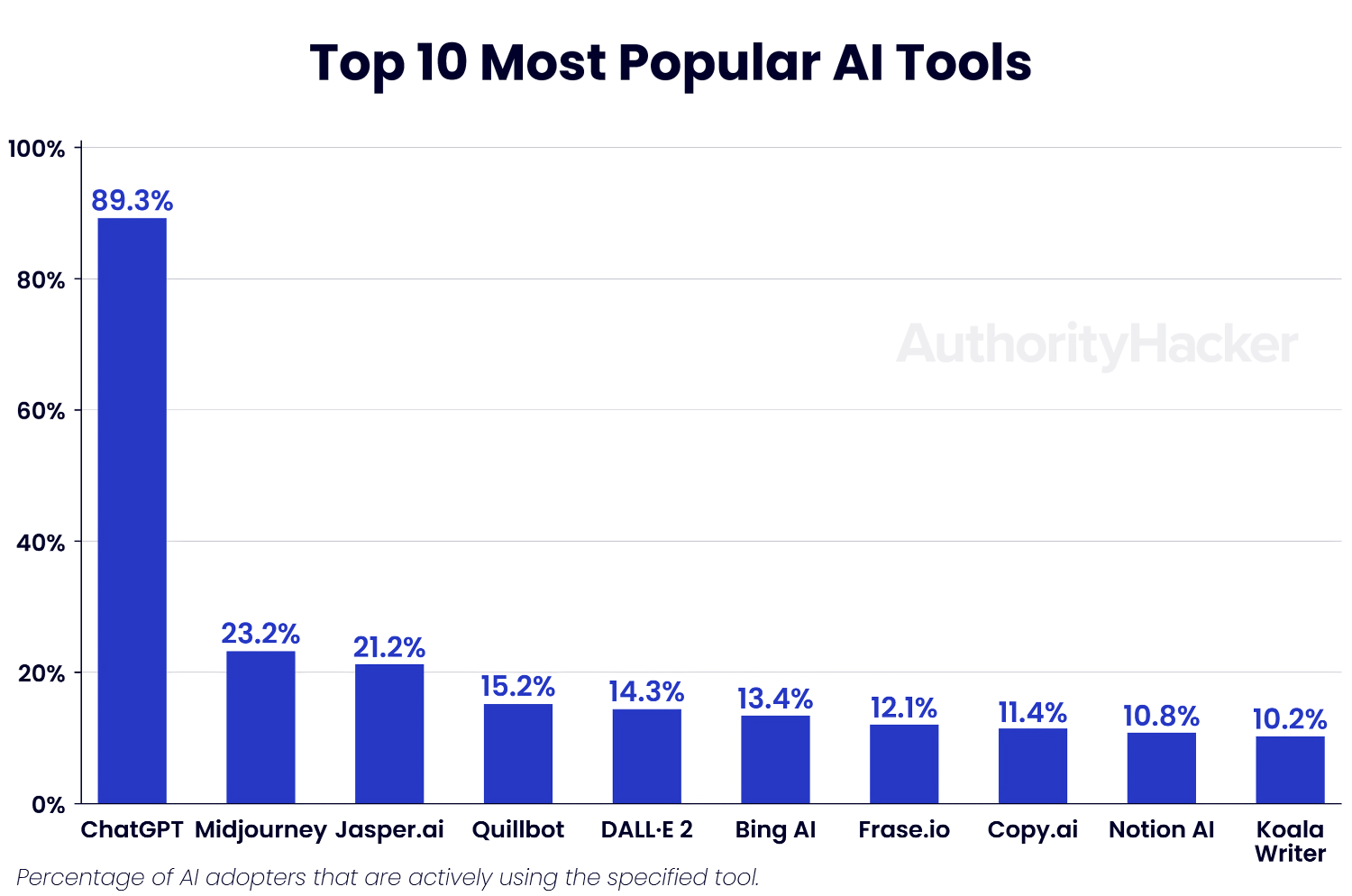
Why the rapid adoption? This is likely due to ChatGPT’s free basic account and affordable paid options, making it accessible to all. I’m personally glad OpenAI decided to go with this approach rather than gate it behind some exorbitant enterprise pricing.
While ChatGPT reigns supreme, other free and paid tools still thrive. Jasper (formerly Jarvis), Frase, and Copy.ai are a few of the notable commercial tools that have been around since the underlying GPT-3’s debut in 2020.
When we looked at just AI image-generation tools, Midjourney (54.4%) and DALL-E-2 (33.7%) were dominating that segment of the market.
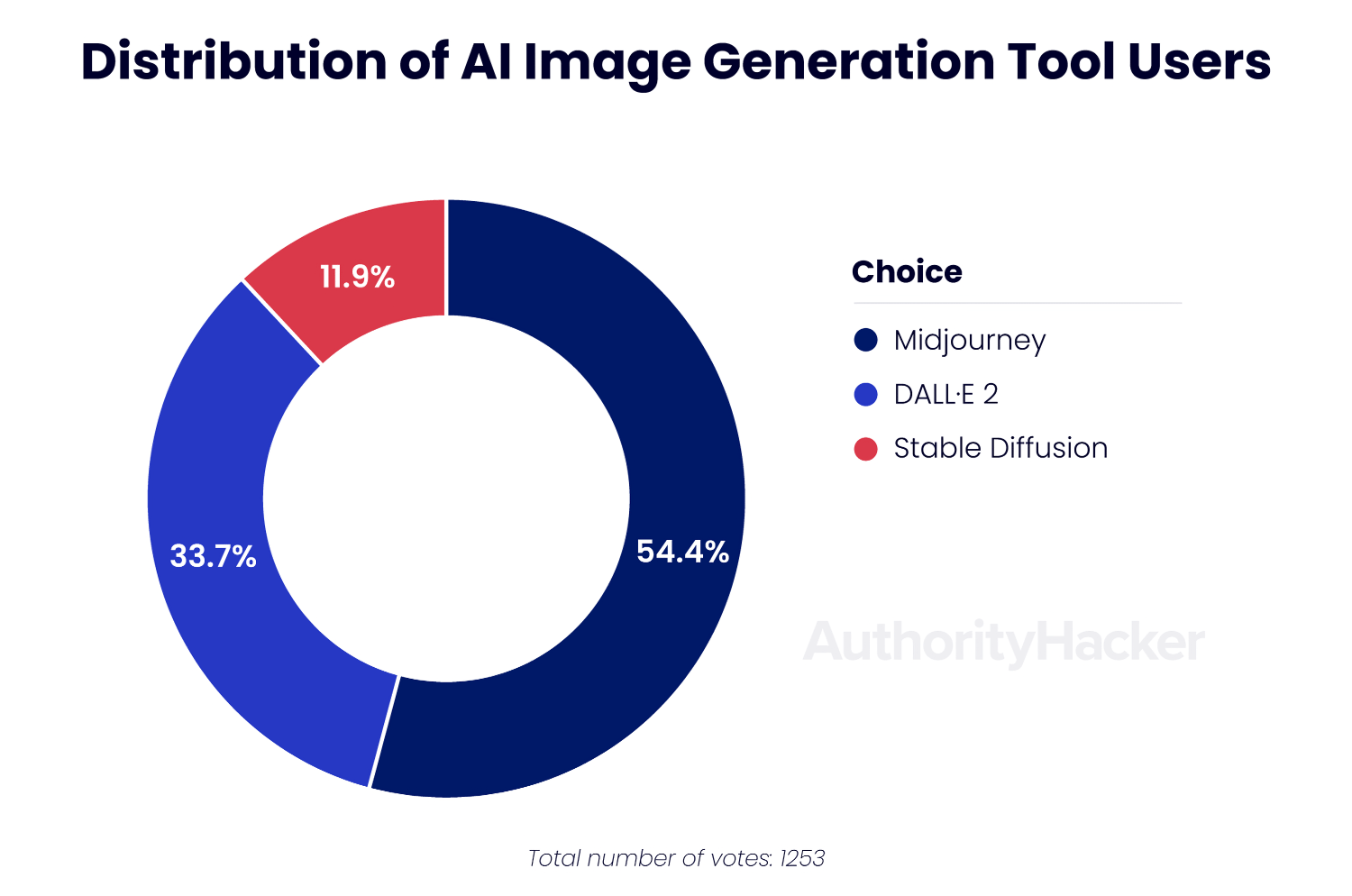
Interestingly, ChatGPT and DALL-E are both owned by OpenAI, but it seems they still have some way to go in dominating the image-generation market.
85.1% Of AI Users Are Using It For Blog Content Creation
We asked our AI using respondents what they use AI for. A whopping 85.1% reported using it for article or blog writing, while 47.8% put it to work for copywriting. Admittedly there is some overlap between these two use cases, but it’s clear that AI tools are being used predominantly for content creation.
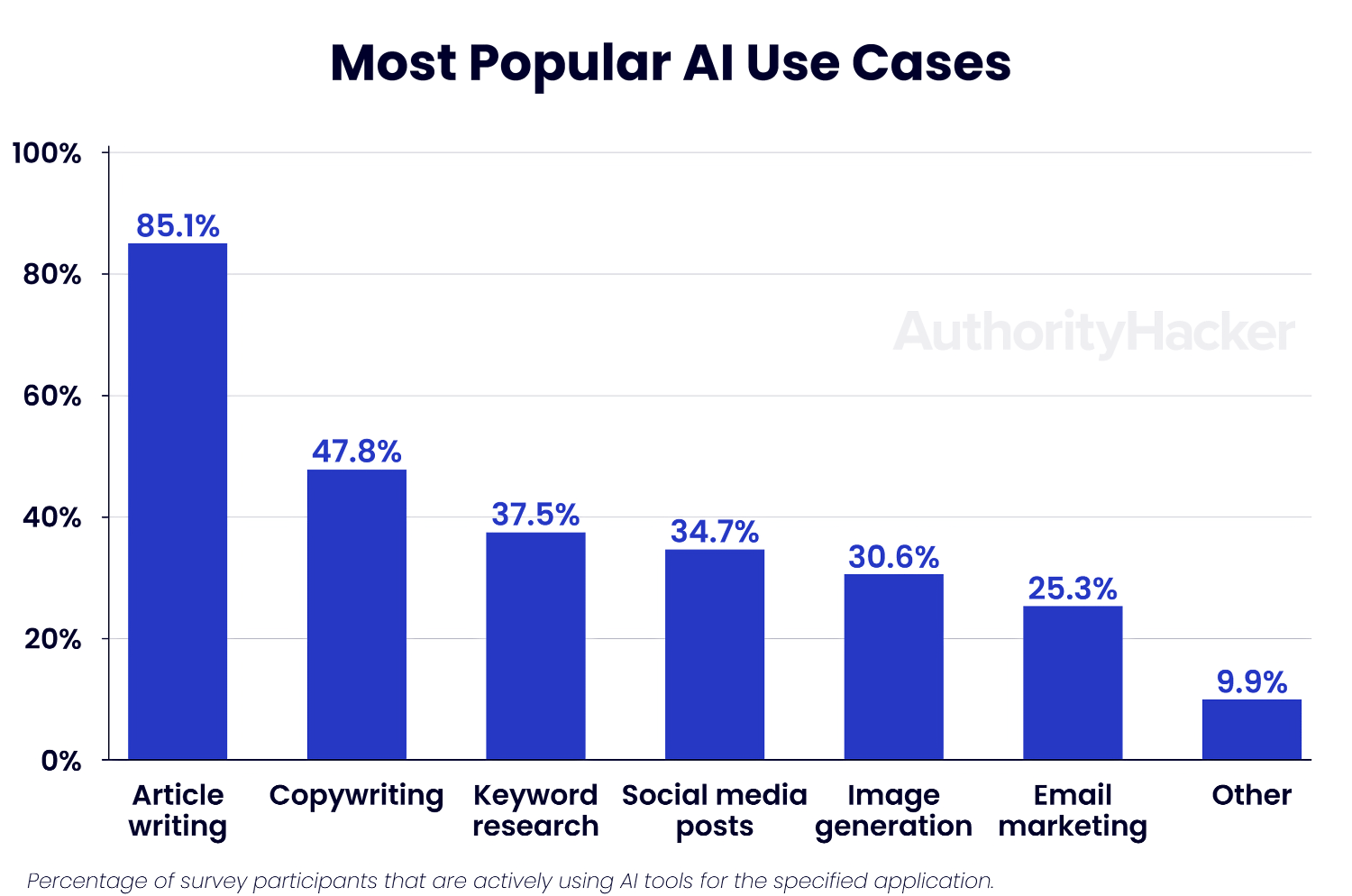
SEO keyword research is another AI favorite with 37.5% harnessing its power. AI is brilliant in generating seed keyword ideas, though in our experience it’s less adept at completing a full set of keyword research.
As users become more proficient with AI, it’s likely that we’ll see an increase in more complex prompts and use cases too.
Check out our recent podcast where we dish out 9 ChatGPT prompts for content creation, keyword research and link building.
65.8% Of People Think AI Content Is Equal To Or Better Than Human Writing
When GPT-3 was first released, many commentators, myself included, claimed it couldn’t outwrite humans. Well, GPT-4 has proved us wrong. Indeed, nearly two-thirds of people in our survey now believe AI is just good or even better than humans at crafting content.
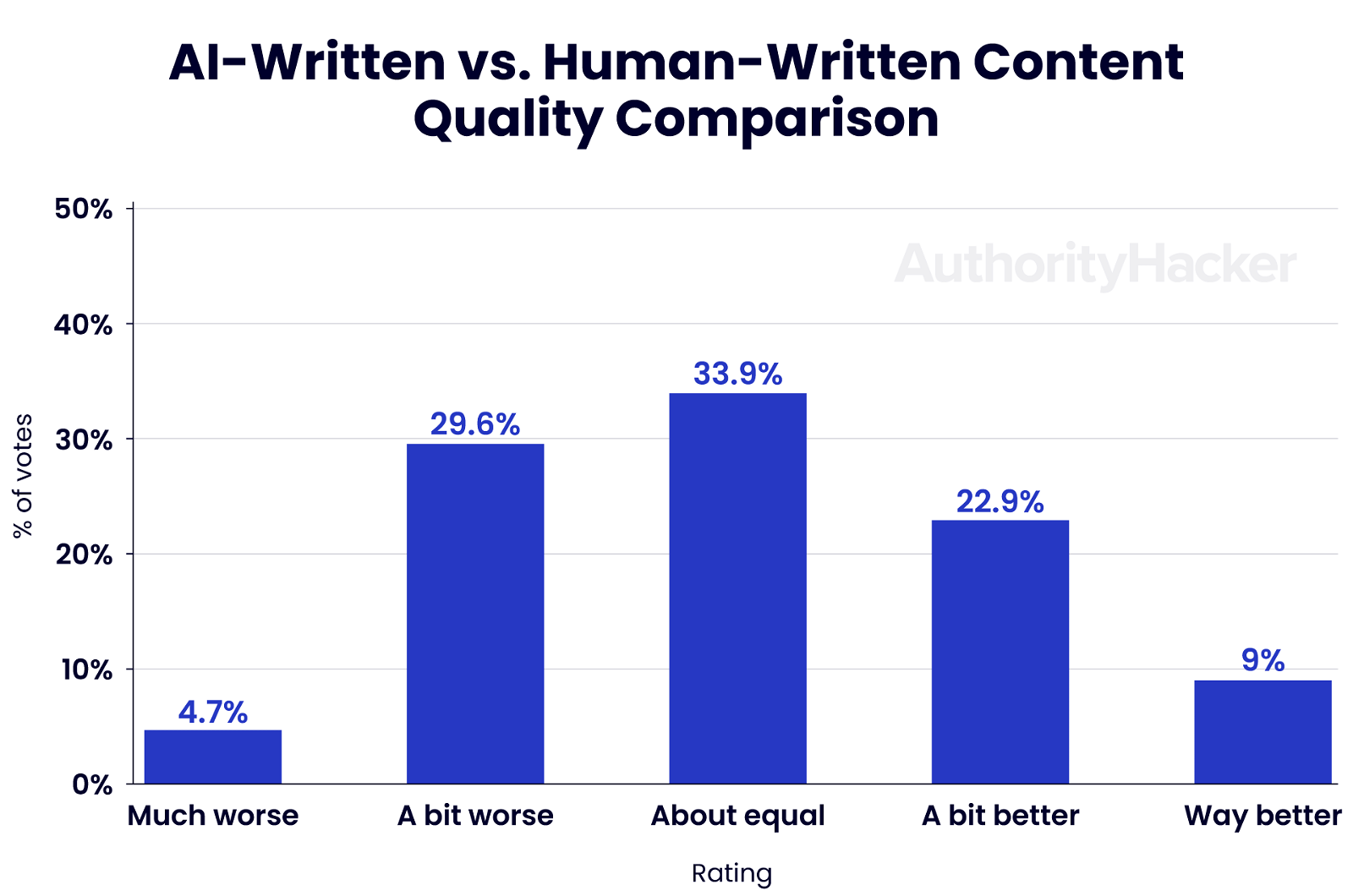
This is very significant.
The quality of the content ultimately depends on the quality of the prompt and guidance you feed the AI. But even a mediocre input can generate impressive AI output.
Recently, Google has changed its stance to declare it doesn’t care if content is AI generated or not, so long as it’s high quality. This has given publishers the green light to embrace AI with open arms.
But what does this mean for writers? Job security could be at risk in the very near future, although there is evidence that many writers are already enlisting AI to produce content (more on that later)…
63% Of People Are Worried About Bias Or Inaccuracies In AI-Generated Content
Our survey revealed that 63% of respondents identified bias and inaccuracies in AI-generated content as their biggest challenge.
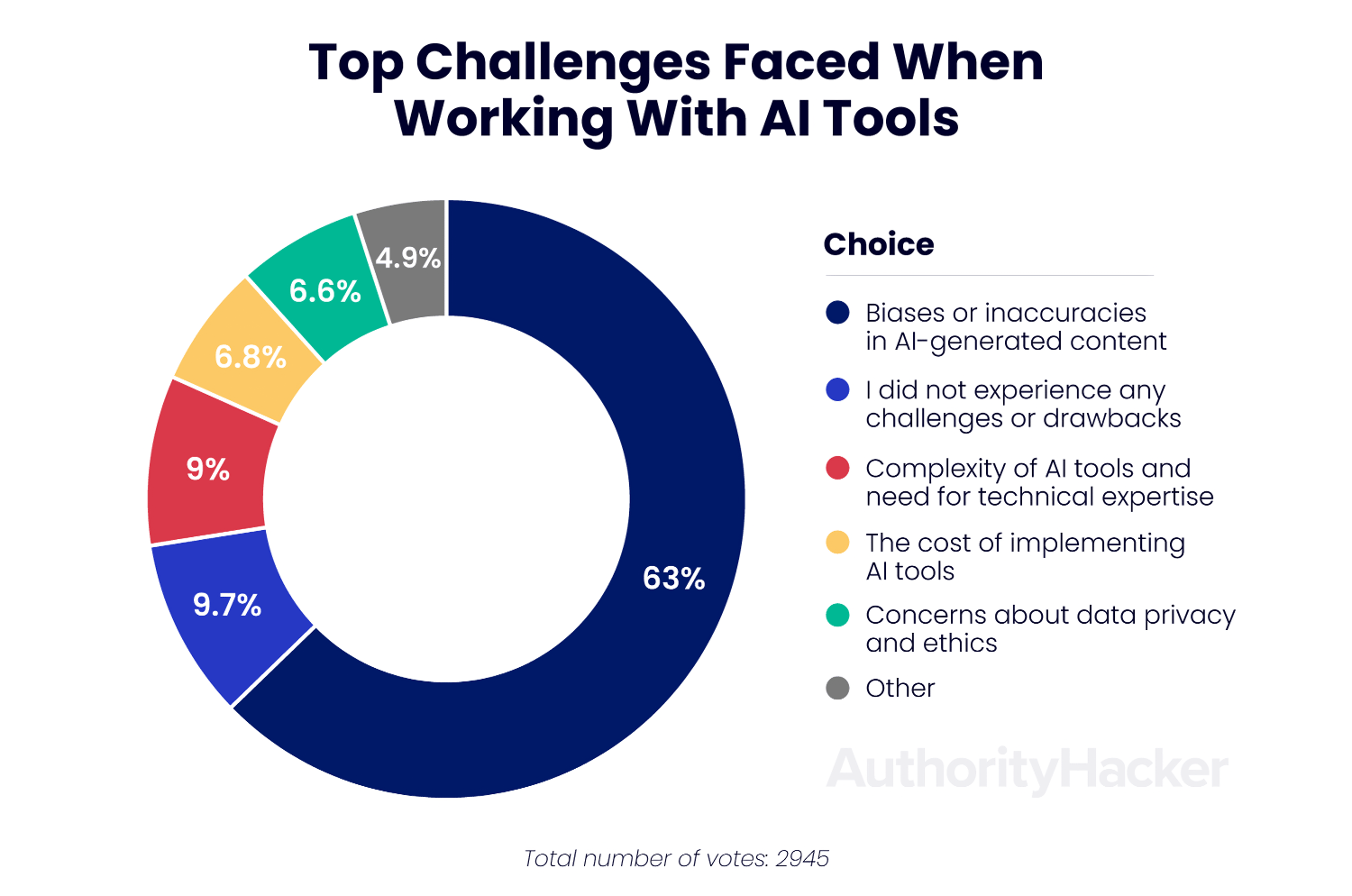
AI’s convincing writing can be problematic when it gets basic facts wrong because it’s not obvious.
Most teams we’ve spoken to tackle this by incorporating checks to their editorial process. However even major publishers are getting it wrong. CNET.com famously created an AI article with wildly incorrect interest rate information.
While human editors also occasionally let mistakes slip, marketers seem to trust them more than AI tools.
Fortunately the vast majority 88.1% of respondents said they verified the accuracy of AI-generated content.
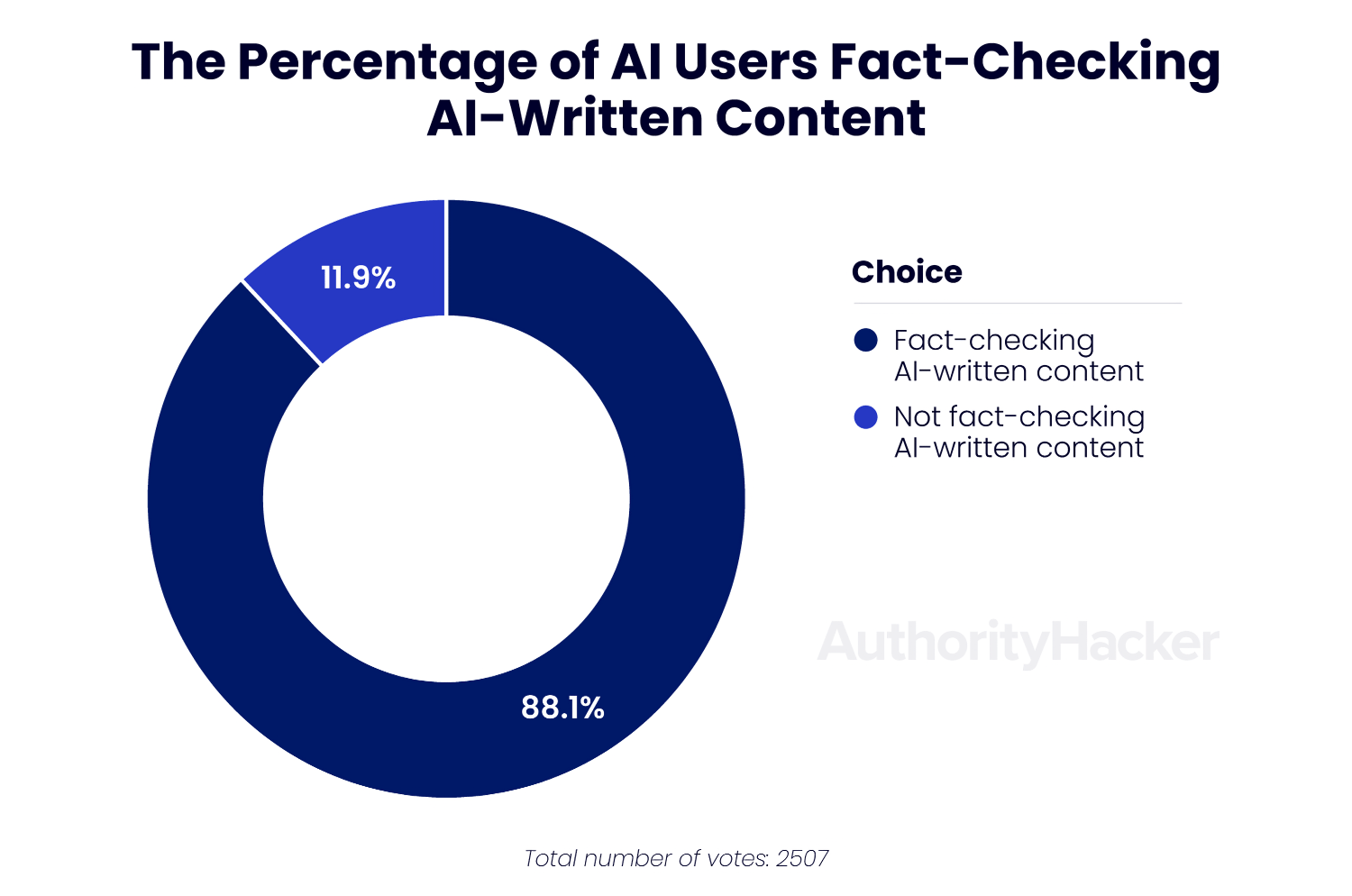
But having seen inside countless teams’ editorial processes, I can say for sure that the thoroughness of these checks will vary wildly from company to company.
It’s one thing to have a process to fact check. It’s another for that process to be robust and tightly followed.
What’s concerning is the 11.9% of marketers who are not fact checking their AI-generated content. AI is notorious for making up facts and this segment of people have no qualms about publishing that unchecked.
This may be a small percentage of users, but given their near unlimited ability to generate lots of content, this poses a risk for the industry.
Only 14.03% Of Users Trust Keyword Data From AI Tools
In a previous question about AI uses, 37.5% of people were using it for keyword research. However, we found that only 14.03% of these users trusted the keyword data from AI tools.
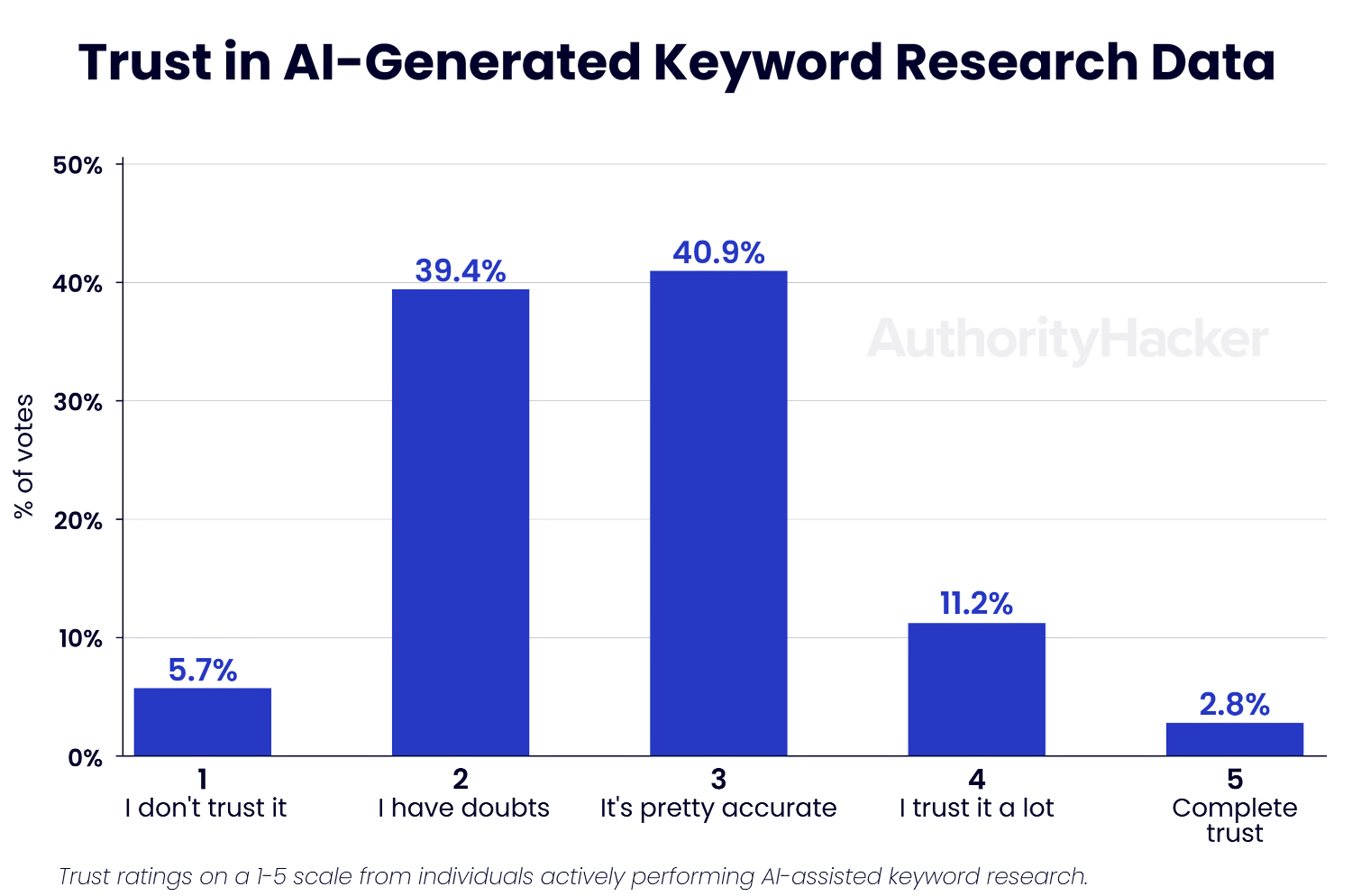
This is understandable as it’s easy to replicate a scenario where AI simply makes up the data. Try asking AI to find keywords and their volumes for a number of keywords related to a topic. Check the numbers. Then repeat the process. Chances are, you’ll get completely different numbers each time.
While 100% accuracy is impossible, AI’s wild data variances leave users skeptical and rightfully so.
Only 32.5% Of Users Trust AI-Generated Search Results
Bing pioneered search integration but many doubt that AI can provide them with the information they need.
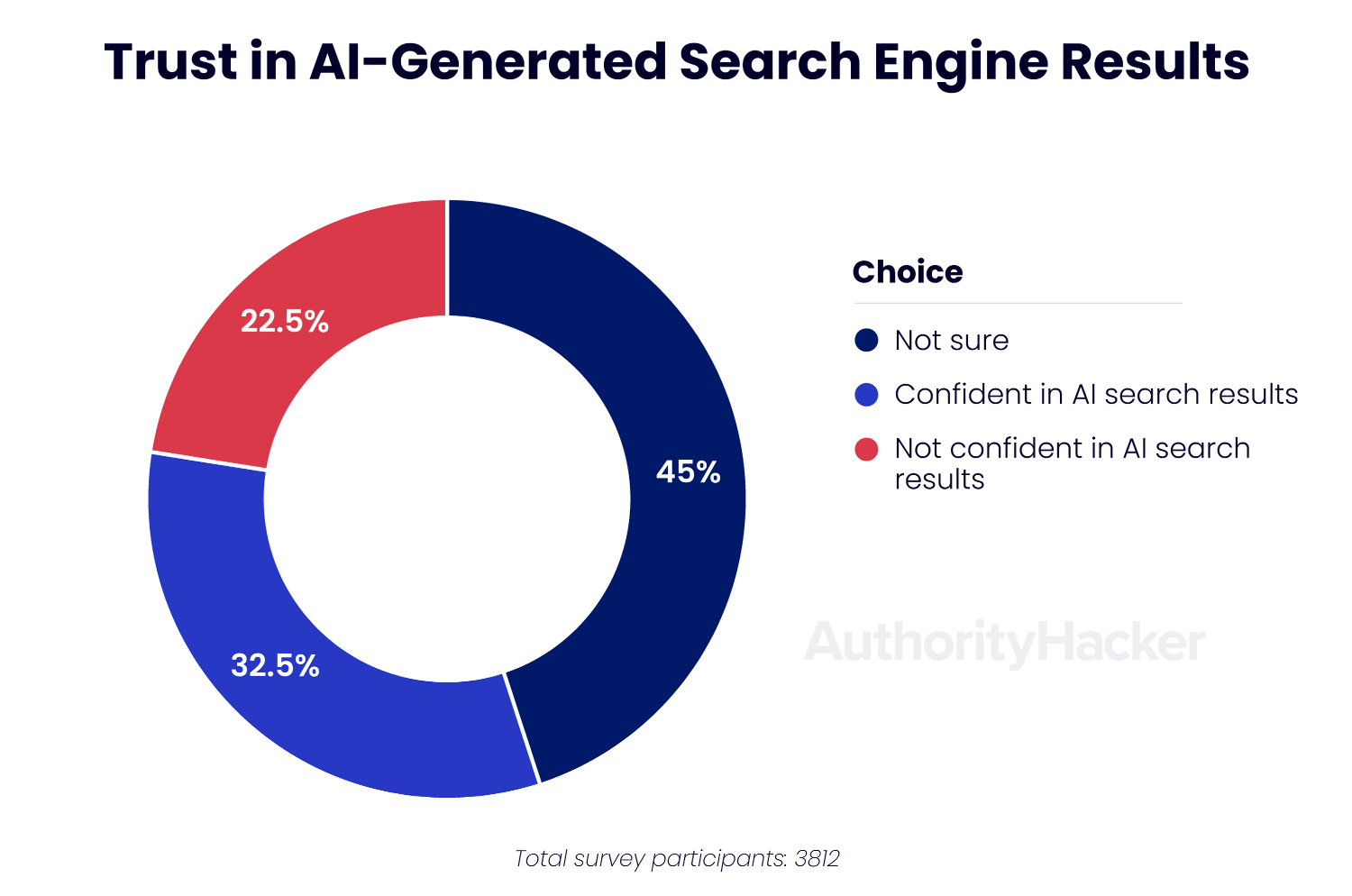
Google and other search engines have long utilized AI technology to improve organic search results. So this question focuses more on the switch from traditional search interfaces, to the perception of an AI interface.
Google has positioned its Bard AI service as distinct from Google Search, mitigating any initial trust issues that users may have when using it. If users dislike Bard, they won’t perceive traditional Google Search as declining in quality.
98.1% Of Marketers Acknowledge That Some Understanding Of AI Is Important For Their Jobs
The vast majority of respondents (89.1%) said that it was at least slightly important for marketers to have an understanding of AI for their jobs.
But 79.98% said it was very important or extremely important. This is quite an extreme result and shows how marketers see AI becoming an integral part of their jobs.
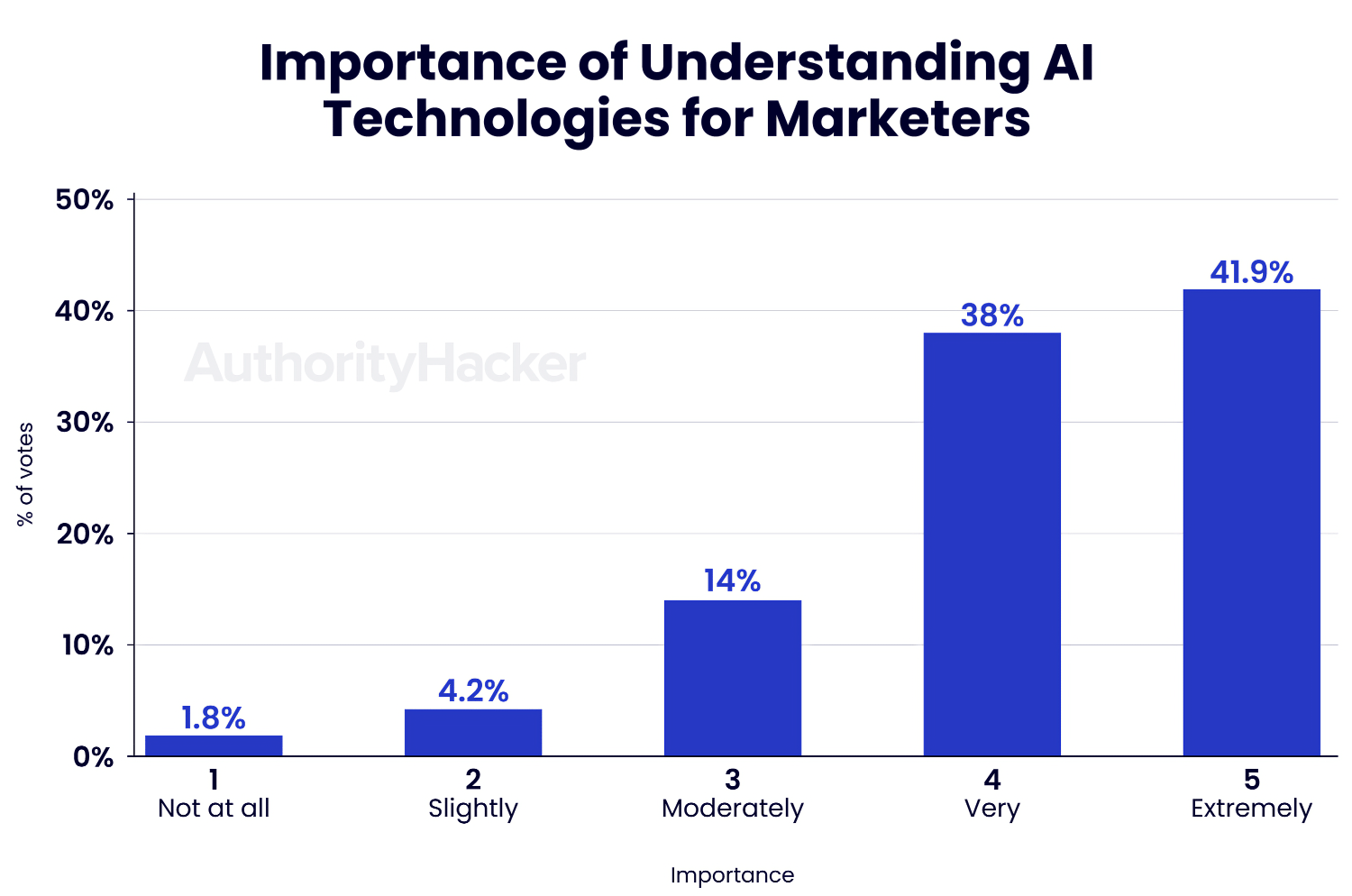
AI is already becoming an entwined is popular business tools like Microsoft Office and Notion. I’d go as far as to say that most office jobs will require some basic AI skills in the near future.
For marketing, this is arguably more important. The zero-sum game nature of SEO, means that there are only 10 websites that can claim the coveted spots on the first page of Google. Not to ignore cost, but this competition may be the driving force behind the fast AI adoption we’re seeing in online marketing.
90% Of Marketers Are Confident In Their Ability To Learn And Adapt To New AI Tools And Technology
The good news is that 90% of marketers are confident in their ability to learn and adapt to new AI tools and technologies.
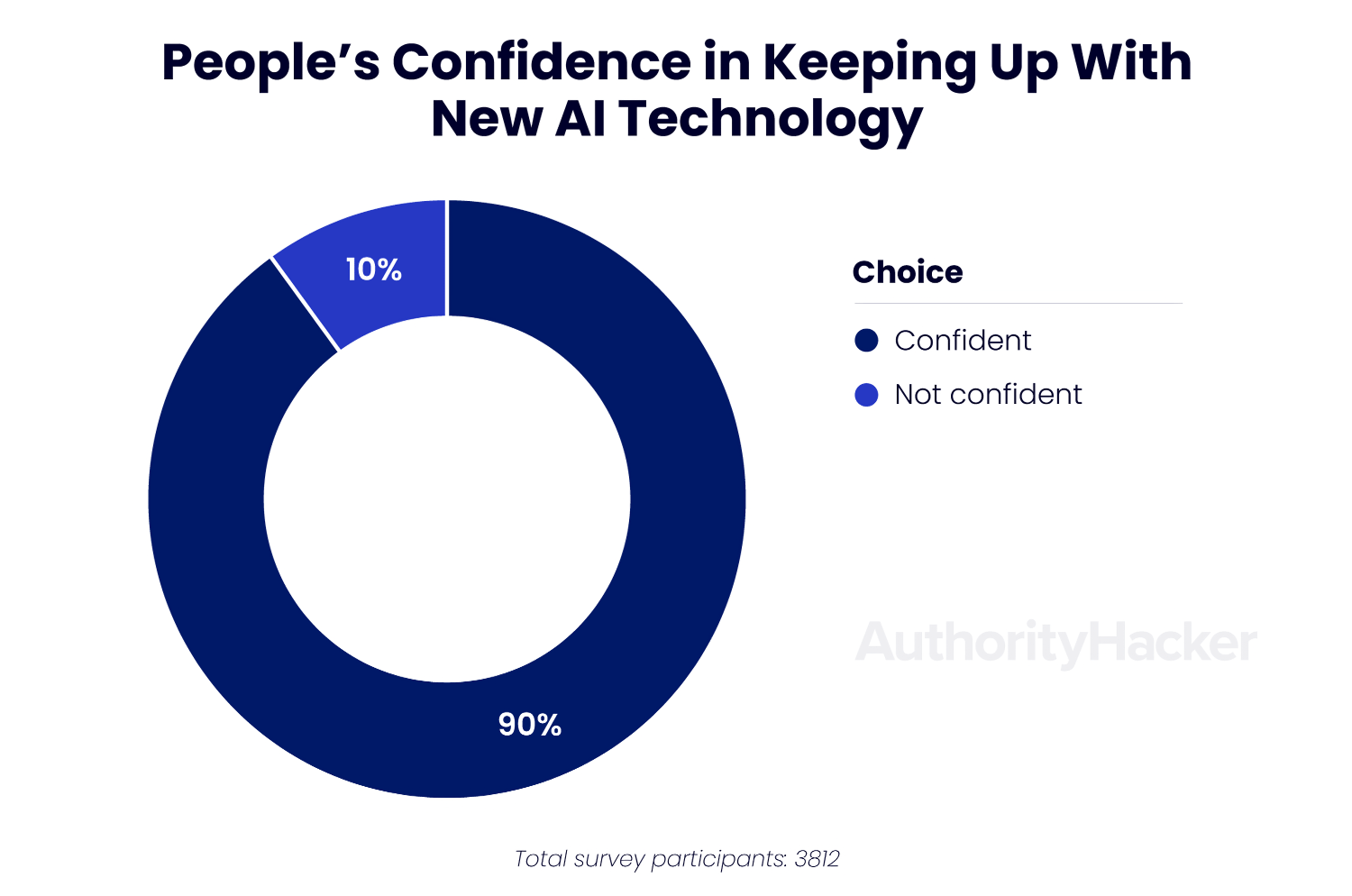
AI tools are easy to get the hang of. No coding or complex commands are required since all instructions can be given in plain English. So it makes sense that most marketers feel confident in their ability to use new AI tools.
Online marketers tend to be quite tech savvy and therefore should find it easier to pick up new technology faster than the general population.
Although basic tasks are simple with AI, it can very quickly get more complex. Long, detailed prompts require lots of experimentation to get right.
I think that we’ll quickly start to see two levels of AI usage. A basic level for simple tasks that everyone can do. And a far more advanced level for complex tasks that few can master. Think of Excel: you can use it for basic calculations, or you can use it for complex formulas and macros. Far fewer people have mastered everything it’s capable of.
81.6% Of Marketers Think Content Writers’ Jobs Are At Risk Because Of AI
We asked our respondents which jobs they felt were most at risk of being replaced by AI. 81.6% said that Content Writers’ jobs were at risk. That is significantly more than any other profession.
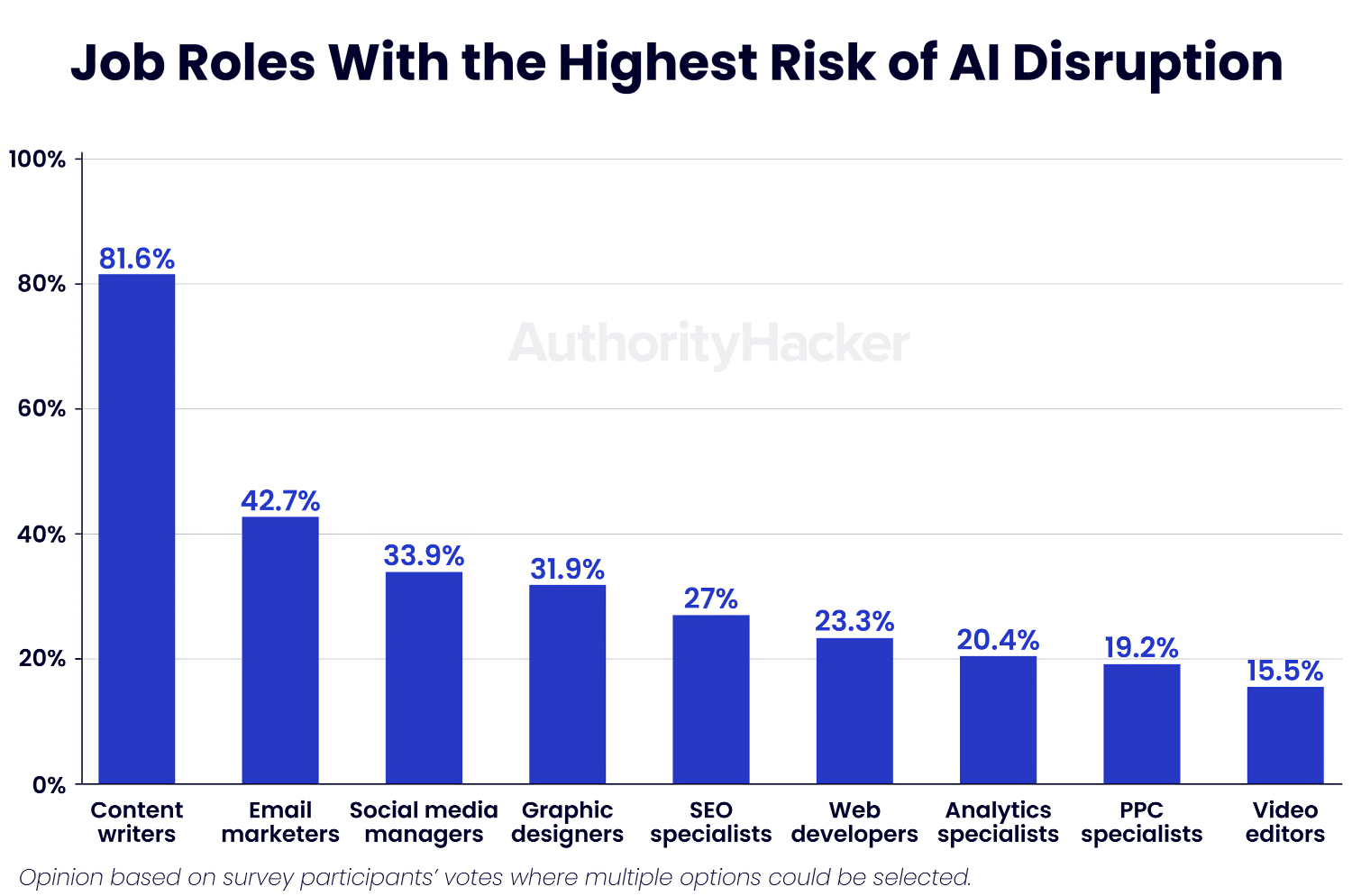
There are two tiers of writers in the marketing world. There are topic experts who bring a wealth of knowledge and experience to the table and command high prices. Then there are “SEO writers” who lack specialist skills and simply write on any topic with a quick Google search.
This second group is most at risk in the immediate future because they don’t often add value. They just rehash what’s already ranking. That is exactly what AI is doing behind the scenes when you ask it to write something. And while it gets some facts wrong, the end result is usually well-crafted. I think it will be a lot longer before topic specialists and expert writers are replaced by AI.
Smart writers are probably already using AI themselves to help them churn out content faster.
But it’s not just writers who should be on high alert: other roles involving content creation such as email marketing and social media marketing could see job losses too.
Over Half Of Marketers Have Some Concerns About AI Replacing Them In Their Own Jobs
Half of marketers (50.6%) are concerned or somewhat concerned about AI taking their jobs. Though the number who are most concerned is lower at only 8.1%.
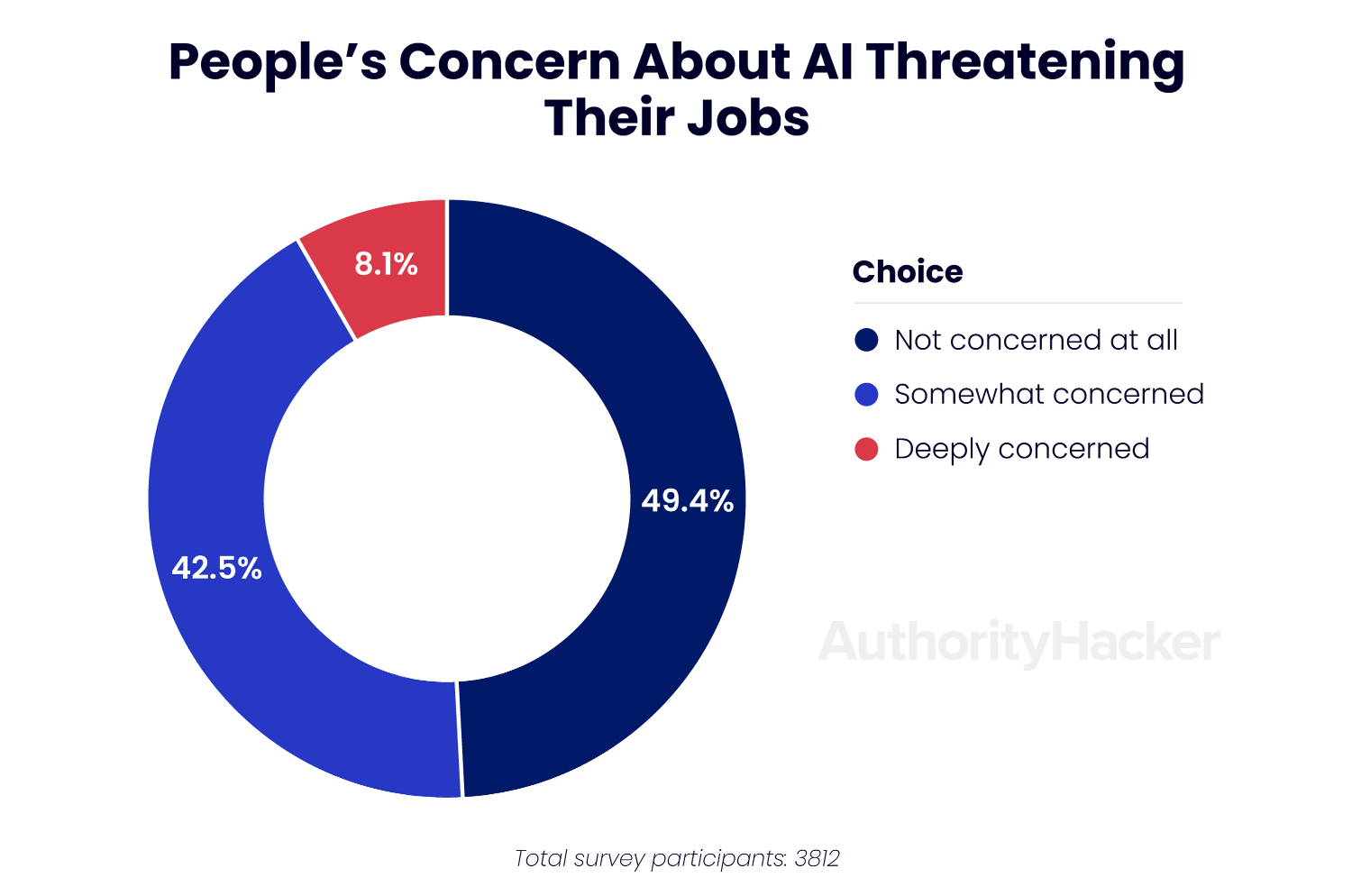
This could be because it’s just too early to say how this will impact jobs. While it’s almost inevitable that there will be an impact, and possibly a big one, it is less clear how exactly this will be felt.
If we look back to the later parts of the 20th century, the rise of computers and the internet led to job losses. However many more new jobs were created that could not have been predicted, including many of the jobs that the respondents of this survey now possess.
Those who are adaptable and embrace AI technology will stand the best chance of thriving in any AI influenced job market.
32.9% Of Businesses Have Already Replaced Some Human Tasks With AI Solutions
Changes to the job market could come much sooner than you think – 32.9% of respondents said their business had already swapped out some human tasks with AI solutions.
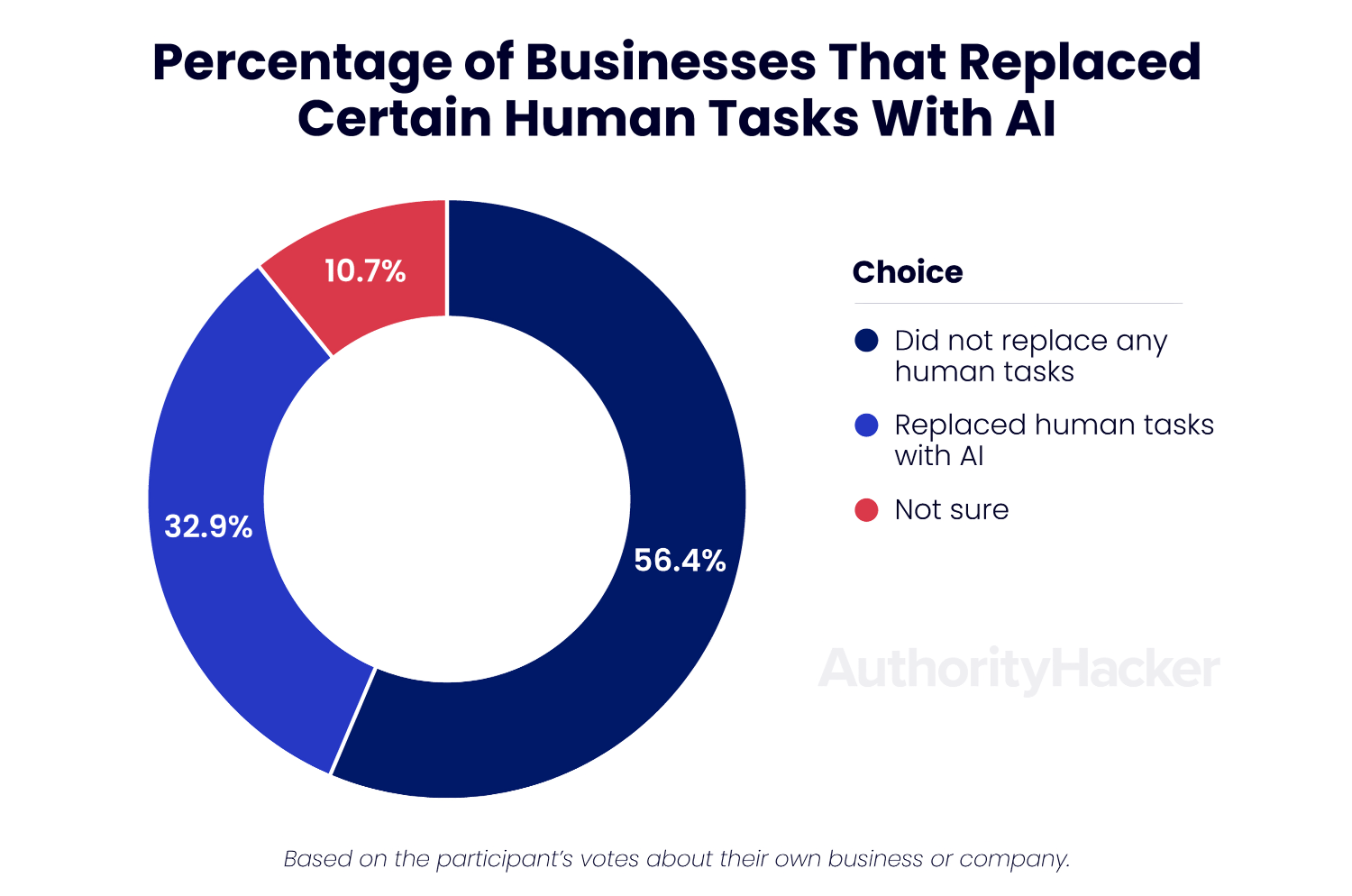
This shows just how quick businesses are at adopting AI tech. Big changes are already in motion here. We’d expect this number to increase significantly over the next 12 months too.
We’re also likely to see the scale of AI replacing human tasks increase as marketers get better at prompt engineering and getting AI to perform bigger tasks. We’re still in the Wild West phase of AI development, where everyone’s racing to figure out its potential. The future is still anyone’s guess.
60% Of Marketers Feel Positive About The Rise Of The AI Industry
We surveyed people’s sentiments towards AI and discovered that 60% view AI positively, 32.2% have neutral feelings, and only 7.7% see it negatively.
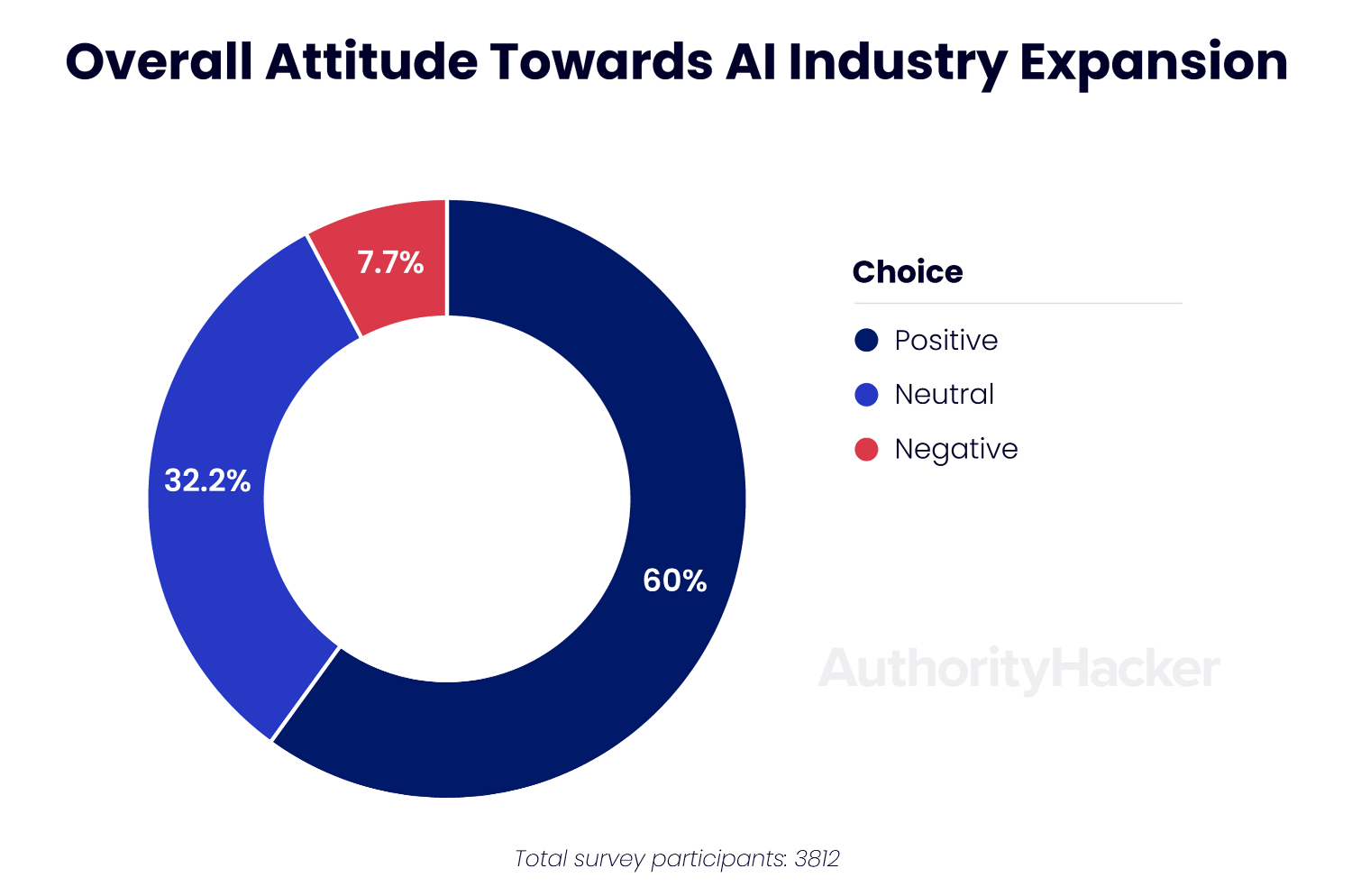
This comes as a surprise, considering the AI-related doom often portrayed in the media. At least for now, few marketers share these concerns.
It’s likely because marketers and small publishers stand to benefit significantly from the use of AI technology in their businesses.
When AI search first emerged, we observed a level of anxiety in our community. The usual “SEO is dead” rhetoric reared its head. Yet as we move through 2023, AI’s impact on marketing has been mostly positive with search traffic remaining strong.
ChatGPT in particular has made AI accessible to all marketers. This is likely driving a lot of the positive sentiment.
Less Than 20% Of Marketers Think AI Tools Will Have A Negative Impact On Content Quality
A previous question highlighted concerns about the accuracy of facts in AI content. We wanted to know how respondents thought AI tools will affect overall content quality in the next five years.
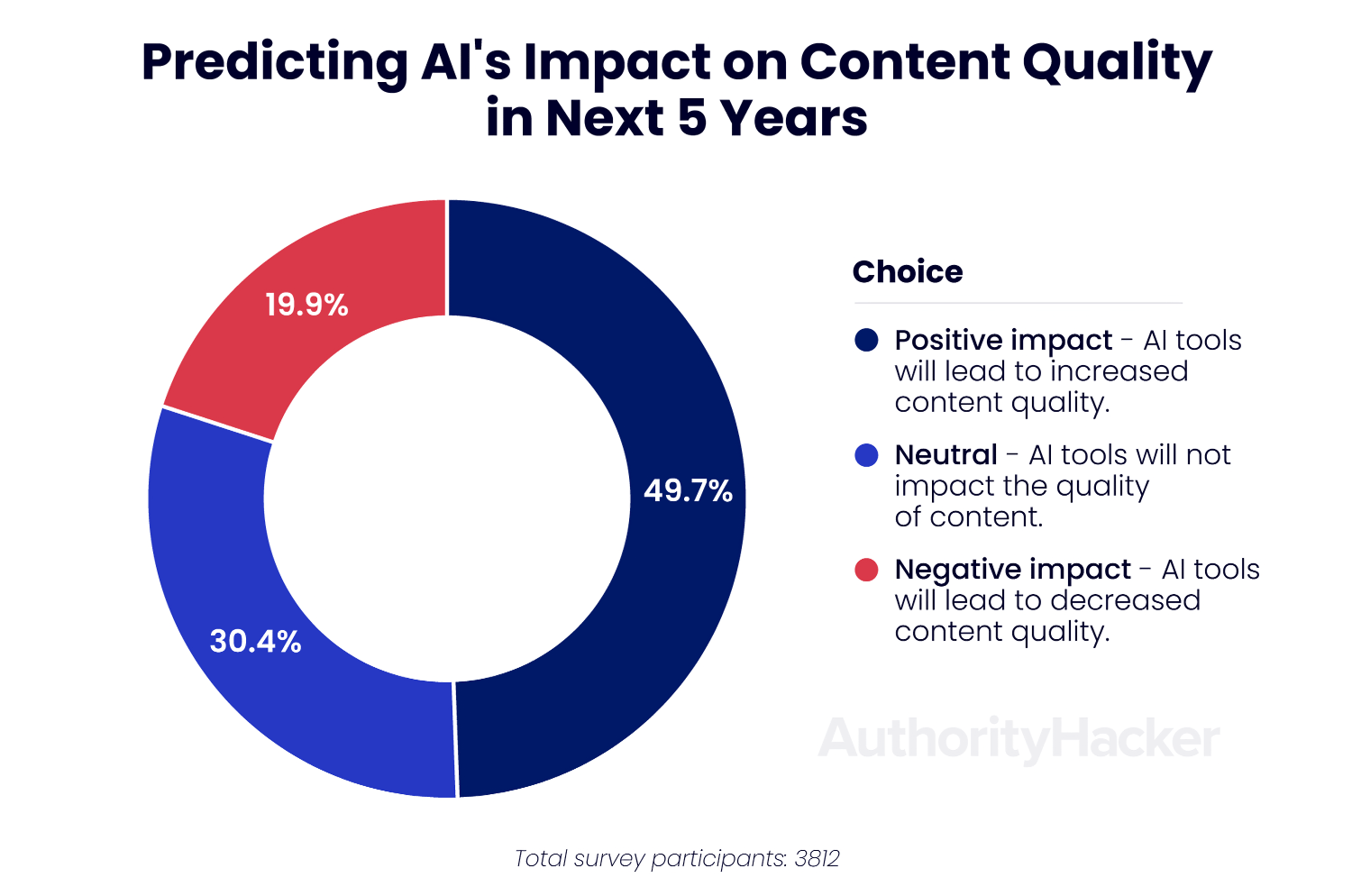
Almost half (49.7%) of marketers believe AI tools will boost content quality. A further 30.4% foresee no impact on content quality. And a mere 19.9% predict a negative outcome.
For those expecting a decline in quality, this is likely due to the potential flood of content. Throwing that out there without any kind of quality checks would result in a lot of bad content.
But the majority remains optimistic. Roughly half of the respondents see AI having a positive impact, likely due to its writing capabilities. Right now, you still need to hand hold it with certain facts and data. But it’s reasonable to assume its accuracy will only improve over the next five years.
Only 30.1% Of Marketers Think AI Will Negatively Impact Search Traffic In 5 Years
Just a few months ago, there were countless blog posts and videos (including ours) worrying about AI taking away a significant portion of search traffic. After all, if AI could give you the answer on the search results page, why would you need to click through to any website?
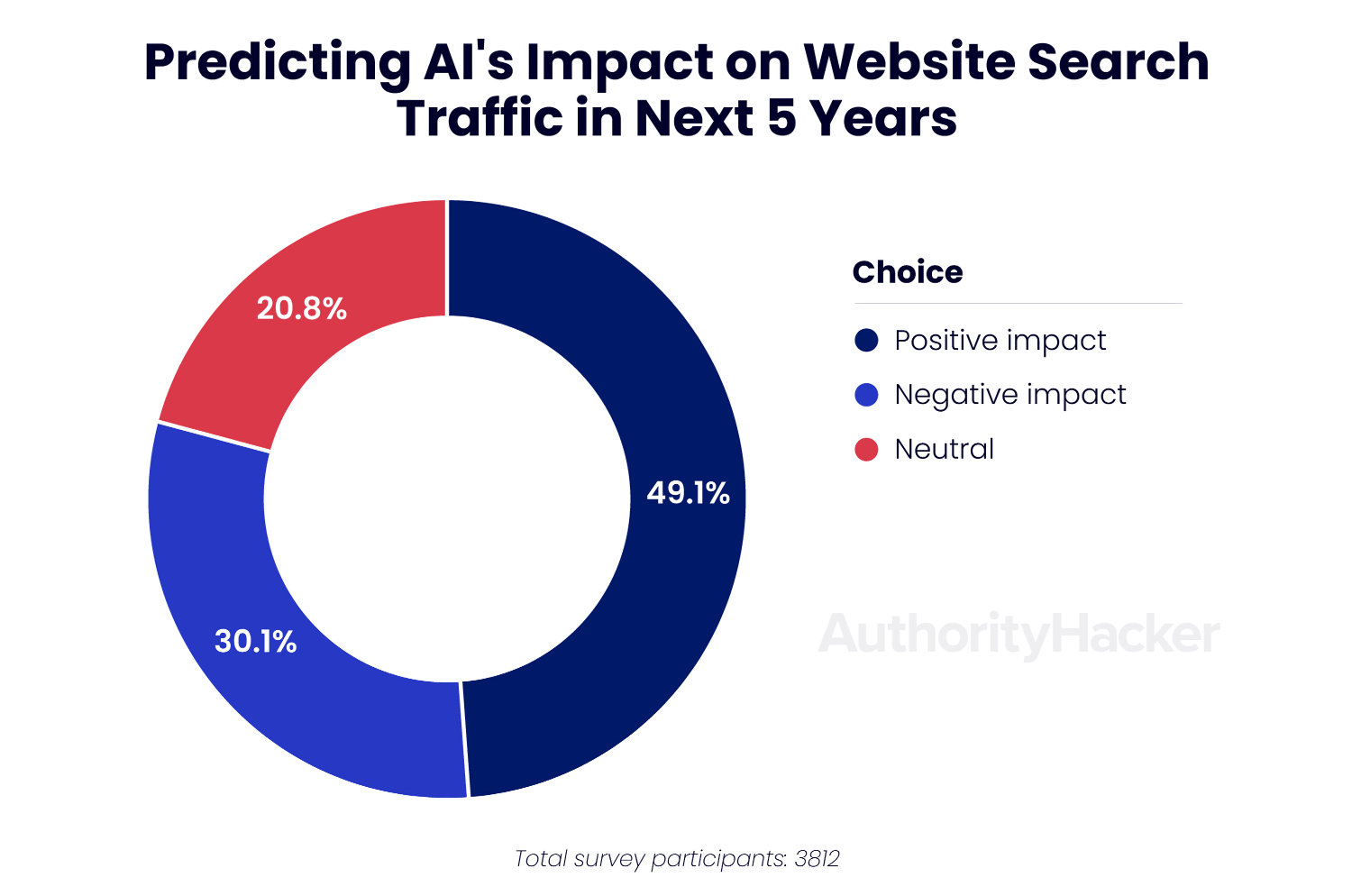
Anecdotally, we’ve seen fewer people worry about it in the past couple of months. There seems to be more of a positive attitude toward how AI will affect the world of online marketing.
Our survey confirms this. Almost half (49.1%) of marketers think AI will have a positive impact on search traffic. And one-fifth (20.8%) think it will be neutral. In both these cases, this could be because marketers are weighing up their increased productivity and output against any traffic that AI in search engines may take away from them.
However, a solid 30.1% still think that AI will have a negative impact on search traffic. That is understandable as we still don’t know what the full potential of AI in search is just yet.
Publishers can take comfort in the fact that AI will still need them to create content for quite some time. AI needs source material to learn from. If you take that away, the AI has worse answers and that would cause less people to use it. It’s clear there is a symbiotic relationship between publishers and AI, which according to Microsoft’s CEO would “live or die” based on its ability to drive people to publishers’ content.
72.6% Of People Are Concerned About AI Content Becoming Indistinguishable From Human-Written Content
Earlier we established that most people think AI content is at least as good, if not better than, human content. We wanted to understand if marketers were concerned about AI content becoming indistinguishable from human content.
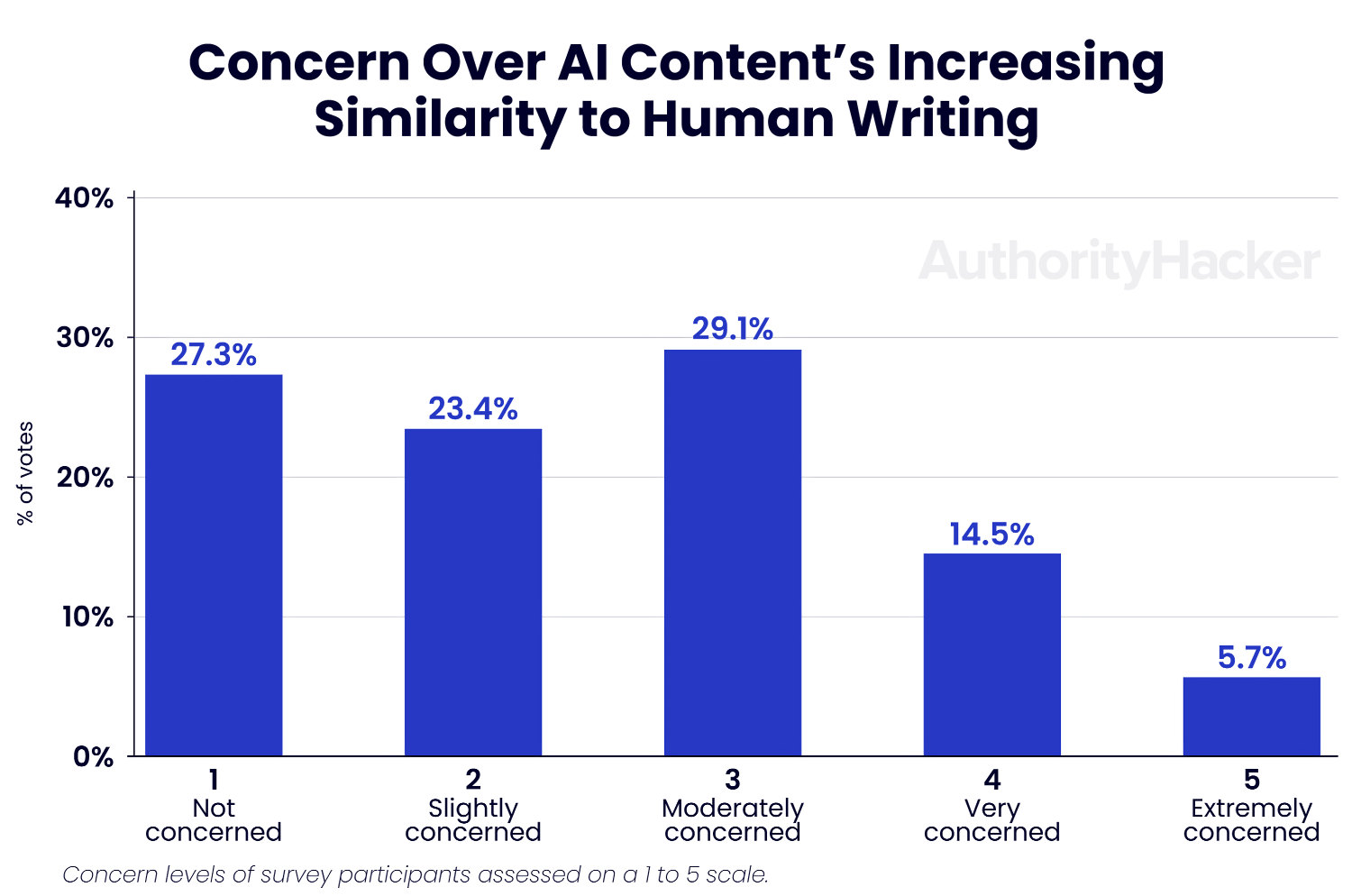
While 72.6% of people expressed some concerns, only 20.2% were very or extremely concerned. As many publishers benefit from this, it’s understandable they are less concerned. We’d expect that if this question was run to content consumers, there would be a greater level of concern.
Google’s stance on this is to evaluate content based on its quality, not how it was made. But individuals are still concerned about not knowing what is and what is not produced by AI.
54.9% Of Respondents Suspect They’ve Received Undisclosed AI Content From A Service Provider
When AI content first emerged, there were numerous tutorials showcasing how to generate and sell AI-written articles. Back in September 2021, we did an experiment and discovered AI content outperformed many cheaper writers. And the technology has only improved since.
More than half of our survey respondents (54.9%) believed they’d received undisclosed AI-generated content from service providers.
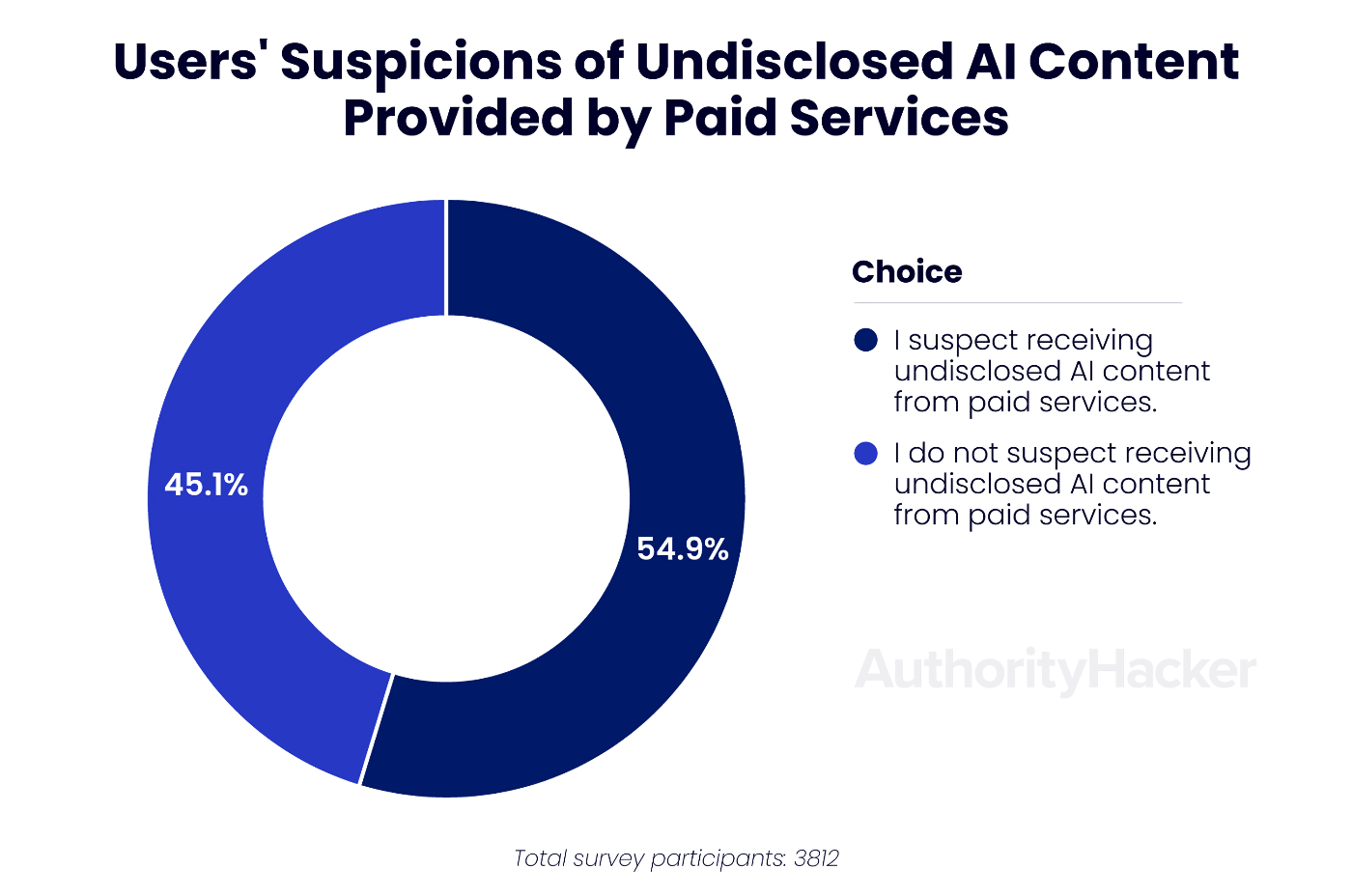
This sparks debate on whether the content’s creation method matters. I’m sure service providers would argue that clients pay for the end product, not the time it takes to create it. This could have a downward pressure on prices if the supply of content can be ramped up considerably.
And a solid case could certainly be made for providers to disclose their use of AI-generated content. We’ll explore that later in this article.
37.4% Of Marketers Are Using AI Detection Tools
It makes sense that managers and business owners would want to know if their employees or service providers use AI tools to do their work.
We found that 37.4% of marketers utilize AI detection. Tools such as Content At Scale and Originality.ai claim to be able to determine if content is written by AI or not.
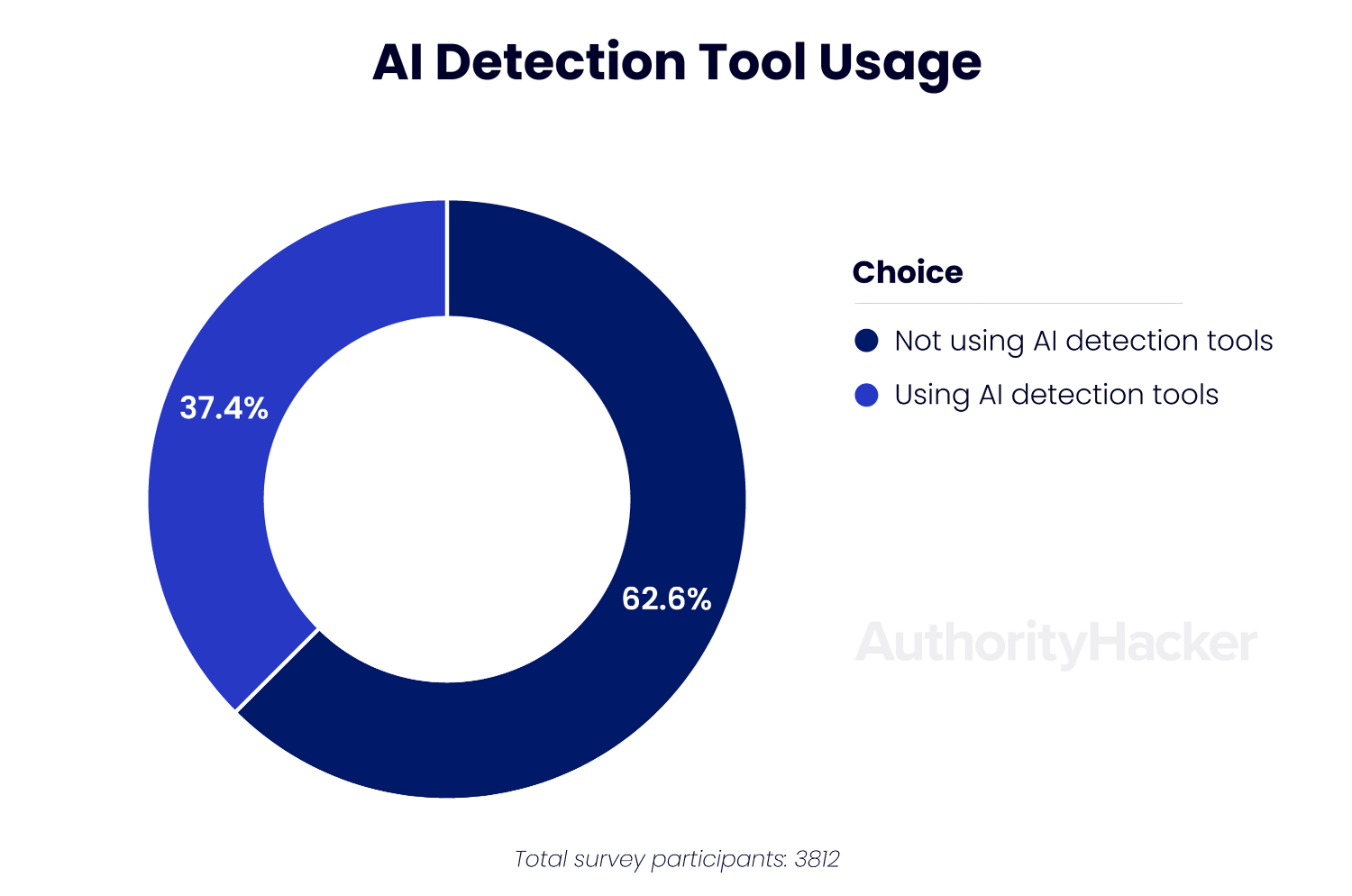
OpenAI has its own AI classification tool too. However it only correctly identifies 26% of AI-written text correctly.
A recent article in NewScientist takes it a step further, stating that reliably detecting AI-generated text is mathematically impossible.
It is worrying that so many people are using AI detection tools which are known to be wildly inaccurate. We’ve spoken with agencies who have had clients use these tools and incorrectly claim that the work was carried out by AI when it was not.
59.5% of Marketers Oppose Mandatory AI Content Disclosures
A big part of the uproar when Gael broke the news that CNET generated AI-written content was how it obfuscated the fact it was written by AI. In some cases, disclosing it only after clicking through to the author page.
Understandably, readers want to know who’s behind the articles influencing their decisions..
Our survey participants were primarily creators, not readers. So it was interesting to see that a majority (59.5%) opposed mandatory AI content disclosures.
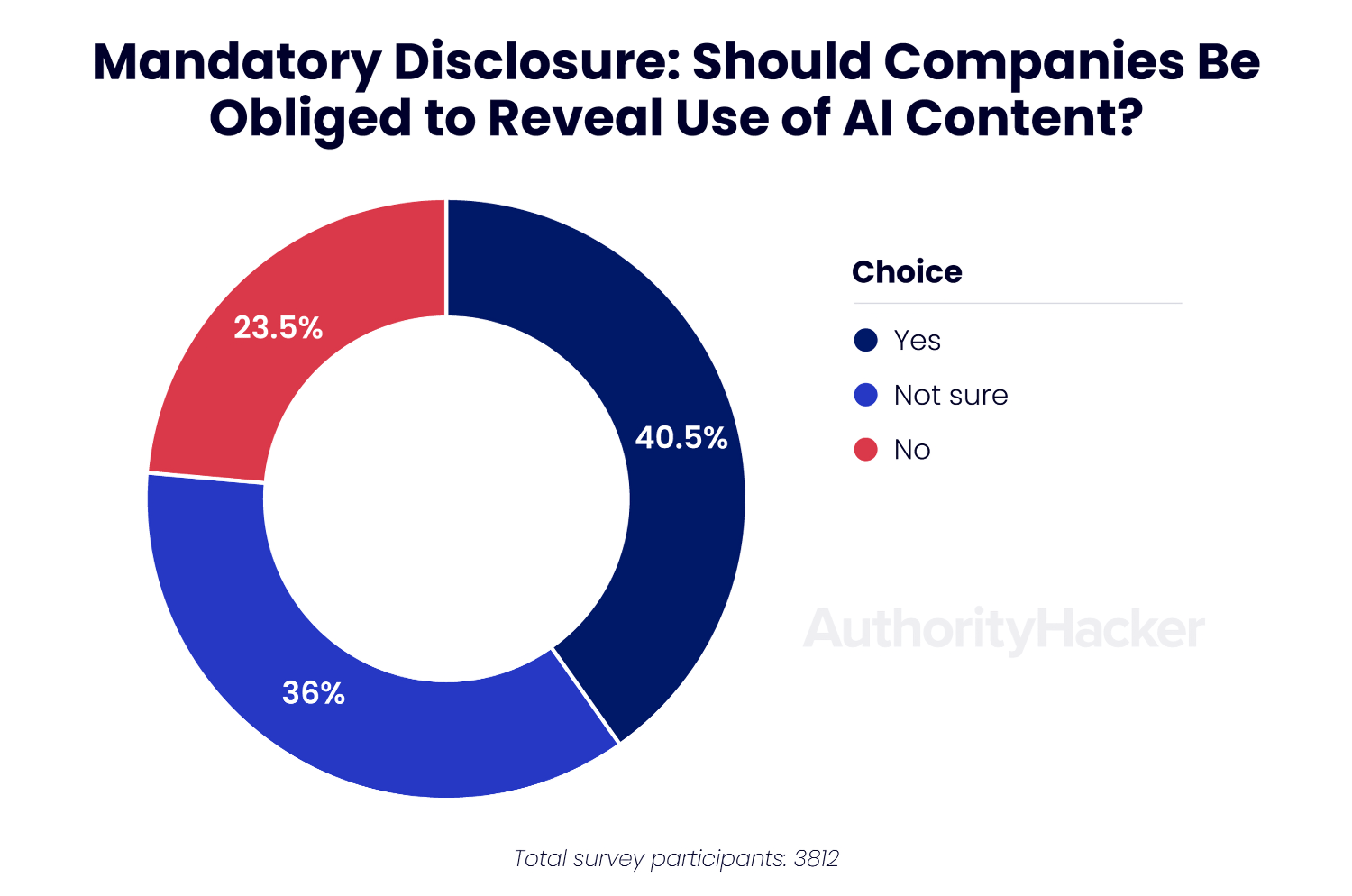
Of the 1,542 (40.2%) of respondents who supported mandatory AI content disclosures, we asked a follow-up question about whether they would disclose their own use of AI on their website.
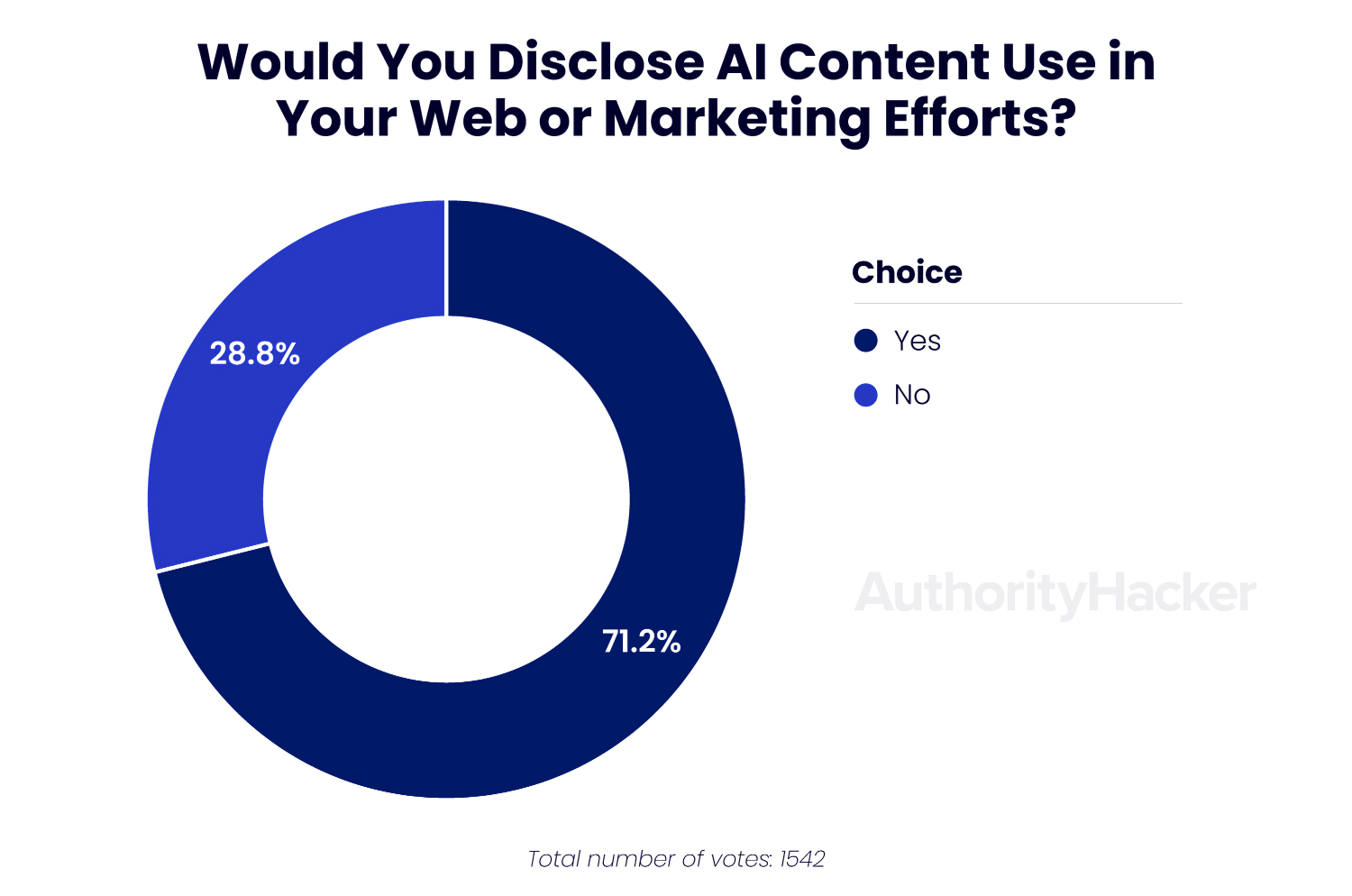
While 71.2% said yes, a noteworthy 28.8% said they would not. Given that these were all people in favor of mandatory disclosures, it does look like there were some double standards here.
Quite how any such laws could be enforced is anyone’s guess.
Over to You
The results of this survey surprised us. AI adoption and usage among marketers is far more prevalent than we anticipated.
While we can’t ignore the risks of AI, it seems that we are already in a place where most marketers are already making heavy use of it. There are clear benefits to businesses who are at the forefront of this revolution – cost savings, improved quality and speed of execution. But it may be some time before we know the true cost and impact of this technology.
Looking back, I’m reminded of the incredible article on Wait But Why published 8 years ago now. Author Tim Urban explained how AI was getting exponentially faster, and that perceiving its growth accurately was challenging for us humans.
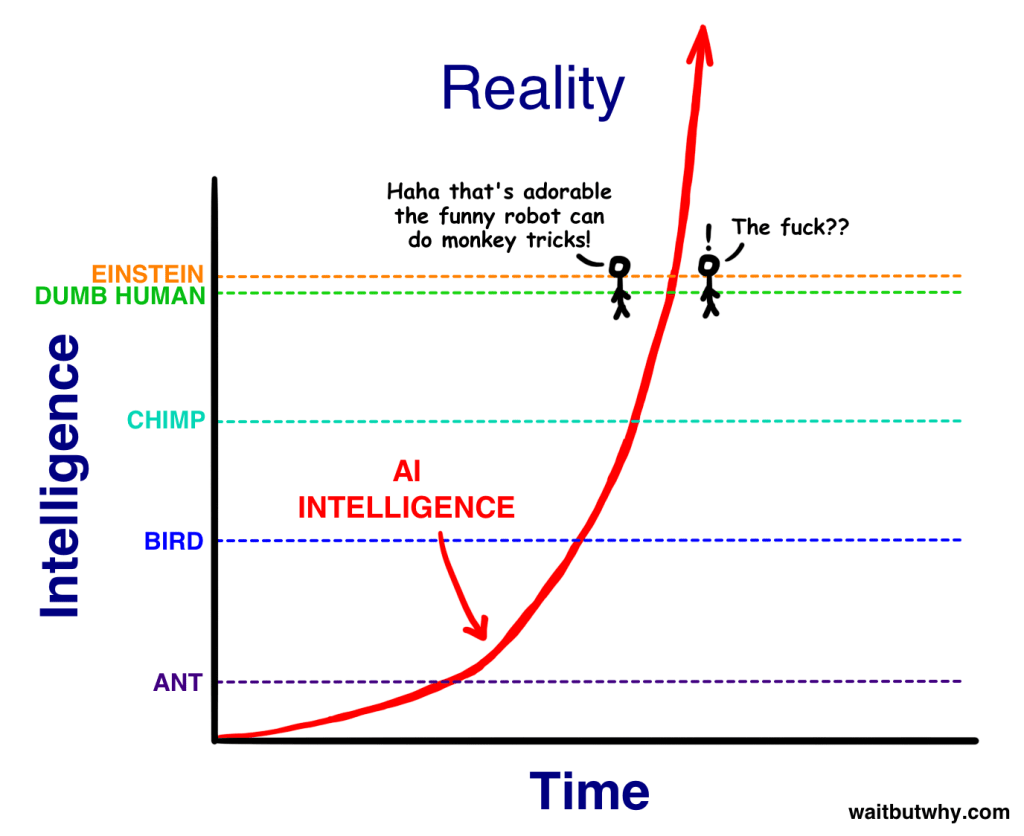
In 2015, at the time AI was slightly smarter than an ant. This year we’ve seen AI pass the US Medical Licensing Exam and the bar exam. What happens next is anyone’s guess…
But what’s your take on our findings?
Share your thoughts on our Twitter thread.




